Difference between revisions of "User:Zocky"
m (1 revision: import dev changes) |
m (1 revision: import dev changes) |
(No difference)
| |
Revision as of 00:30, 22 November 2012
{ {#flush:{
"timeline":
{
"headline":"The Main Timeline Headline Goes here",
"type":"default",
"startDate":"2000",
Intro body text goes here, some HTML is ok
","asset": { "media":"http://yourdomain or socialmedialink goes here.jpg", "credit":"Credit Name Goes Here", "caption":"Caption text goes here" }, "date": [ { "startDate":"2,022", "endDate":"2,022", "headline":"Embassy of the Republic of Slovenia Seoul",
"text":"The Embassy of the Republic of Slovenia in Seoul was opened in 2022 as an official representative body of the Slovene Government in South Korea. The embassy provides consular assistance and promotes bilateral political, economic, and cultural relations.
","asset": { "media":"", "credit":"", "caption":"Caption text goes here" } } ] "date": [ { "startDate":"2,020", "endDate":"2,020", "headline":"Slovenian Film Database",
"text":"The Slovenian Film Database is a website dedicated to Slovenian films, organizations and professionals, working in the field of film. The project, launched in 2020 by Filmoteka Institute for Promotion of Film Culture, is of a non-profit and non-commercial nature and the content is openly accessible to everyone for research, personal and educational use. The project has been supported by the Slovenian Film Centre.
","asset": { "media":"//www.culture.si/images/f/fa/Slovenian_Film_Database_%28logo%29.svg", "credit":"File:Slovenian Film Database (logo).svg", "caption":"Caption text goes here" } } ] "date": [ { "startDate":"2,019", "endDate":"2,019", "headline":"ZIZ Festival",
"text":"The ZIZ Collective has founded the ZIZ Festival in 2019. It takes place on different stages and locations in Maribor, such as Intimate Stage, GT22 and the Small Stage of Narodni dom Maribor, where selected alternative theatre productions are performed. It announces the Gala ZIZ Awards and features also exhibitions, talks, parties and other side events.
","asset": { "media":"", "credit":"File:Festival ZIZ (logo).svg", "caption":"Caption text goes here" } } ] "date": [ { "startDate":"2,019", "endDate":"2,019", "headline":"Centralala.si",
"text":"Created in January 2019, Centralala.si is a Slovenian e-journal for the intersections of improvised music. It is a crossover and connection point for various fields of free improvised music taking place in Slovenia.
","asset": { "media":"", "credit":"File:Centralala.si (logo).svg", "caption":"Caption text goes here" } } ] "date": [ { "startDate":"2,019", "endDate":"2,019", "headline":"Musicslovenia.si",
"text":"The Musicslovenia.si is an online platform, established in September 2019 by a consortium of numerous Slovenian musical institutions, which promotes Slovenian music nationally and internationally. Its aim is to establish a connection between various stakeholders of Slovenian musical scenes and to encourage their national and international collaborations in order to increase the visibility and popularity of Slovenian music worldwide. The official presenter of Music Slovenia is SIGIC, Slovene Music Information Centre.
","asset": { "media":"", "credit":"File:Musicslovenia.si (logo).svg", "caption":"Caption text goes here" } } ] "date": [ { "startDate":"2,019", "endDate":"2,019", "headline":"Bluesland Festival",
"text":"Bluesland Festival, Slovenia International Blues Festival is launched in June 2019, taking place in the courtyard of Ljubljana Castle.
","asset": { "media":"", "credit":"", "caption":"Caption text goes here" } } ] "date": [ { "startDate":"2,019", "endDate":"2,019", "headline":"Grossmann Fantasy, Sci-Fi and Comics Festival",
"text":"Grossmann Fantasy, Sci-Fi and Comics Festival is a three-day event that offers comics, fantasy and sci-fi content. It was established in 2019 and is being held in Ormož, inside the walls of Ormož Castle. The main organizer is the Municipality of Ormož, in cooperation with the Grossmann Fantastic Film and Wine Festival team from Ljutomer, the GPS Society and the Unterhund Club in Ormož.
","asset": { "media":"", "credit":"", "caption":"Caption text goes here" } } ] "date": [ { "startDate":"2,019", "endDate":"2,019", "headline":"Translation Pranger Festival",
"text":"The first edition of the Translation Pranger Festival, the festival of world literature translations and humanities took place in Maribor in 2019. KUD Pranger Cultural Association established Translation Pranger Festival in accordance with the already established Pranger format. Festival consists of analysis and evaluation public talks on translations of novels, short stories, children's and youth literature, essays, dramatics, theory and poetry, which is complemented by the sale of interesting books and the recording and transcription of talks. Conversations is followed by relaxed socializing and discussion among participants. Talks are held at the Maribor Puppet Theater. The first edition of the festival was prepared on the day of the death of St. Hieronymus, the translator best known for the Latin translation of the Bible.
","asset": { "media":"//www.culture.si/images/2/20/Prevodni_Pranger_%28logo%29.png", "credit":"File:Prevodni Pranger (logo).png", "caption":"Caption text goes here" } } ] "date": [ { "startDate":"2,019", "endDate":"2,019", "headline":"Trnovfest Festival",
"text":"The first Trnovfest Festival took place in 2019. Organised and hosted by the Centre of Slavic Cultures France Prešeren (CSKFP) in the Trnovo area of Ljubljana, it is the successor festival to Trnfest, the last edition of which was held in 2018.
","asset": { "media":"", "credit":"", "caption":"Caption text goes here" } } ] "date": [ { "startDate":"2,019", "endDate":"2,019", "headline":"Ulay Foundation Project Space",
"text":"Founded in Ljubljana in 2019, the Ulay Foundation Project Space is devoted to preserving and extending the legacy of Frank Uwe Laysiepen (1943–2020), known professionally as Ulay. The German artist had spent much of the last decade of his life in Slovenia, where he showed his work and co-founded Nastati, an arts institute and creative platform, with designer and partner Lena Pislak. Nastati ceased operating in 2019, to be replaced by the Foundation Project Space.
","asset": { "media":"", "credit":"", "caption":"Caption text goes here" } } ] "date": [ { "startDate":"2,019", "endDate":"2,019", "headline":"Gallery Y",
"text":"Gallery Y is the first specialized exhibition and sales gallery for contemporary art in Slovenia, which has been operating as a specialized program of the online sales gallery and auction house SLOART since 2015, and since September 2019 also as a physical gallery space in Ljubljana, also under the auspices of the SLOART Gallery. The purpose of Gallery Y is to support the most promising Slovene fine artists of the younger and middle generation and to establish an art market in Slovenia. It is led by the team of SLOART Gallery with its director Damjan Kosec.
","asset": { "media":"", "credit":"", "caption":"Caption text goes here" } } ] "date": [ { "startDate":"2,018", "endDate":"2,018", "headline":"Elan Alpine Skiing Museum",
"text":"The Elan Alpine Skiing Museum was opened in June 2018 by the Elan company, one of the most innovative companies in the area of the development and production of skis and skiing equipment, based in Begunje in the Gorenjska region of Slovenia. The museum showcases more than 70 years of development of the Elan skis from the very beginnings up to the most recent, as well as significant milestones in the design of skis. Elan's skis counted innumerable victories in various disciplines; legendary ski champions Bojan Križaj and Ingemar Stenmark competed on Elan skies their entire careers. The latter is considered the best skier of all times.
","asset": { "media":"", "credit":"File:Alpski smučarski muzej Elan (logo).svg", "caption":"Caption text goes here" } } ] "date": [ { "startDate":"2,018", "endDate":"2,018", "headline":"MOMUS, Monumenta musica Slovenica",
"text":"The MOMUS, Monumenta musica Slovenica website features music monuments and sites round Slovenia. The database was compiled in cooperation with the Department of Musicology, University of Ljubljana. The new music web resoruce was set up by SIGIC, Slovene Music Information Centre in November 2018.
","asset": { "media":"", "credit":"File:MOMUS, Monumenta musica Slovenica (logo).svg", "caption":"Caption text goes here" } } ] "date": [ { "startDate":"2,018", "endDate":"2,018", "headline":"Embassy of the Republic of Slovenia in Sofia",
"text":"The Embassy of the Republic of Slovenia in Sofia was opened in 2018 as an official representative body of the Slovene Government in Bulgaria. It promotes bilateral political, economic and cultural relations between Slovenia and Bulgaria.
","asset": { "media":"", "credit":"", "caption":"Caption text goes here" } } ] "date": [ { "startDate":"2,018", "endDate":"2,018", "headline":"Steklenik Gallery",
"text":"In 2018 the Cona Institute started a guest programme at the Steklenik Gallery, a gallery for sound, bioacoustics and art that hosts up to 7 exhibitions a year. It is located at the Tivoli Greenhouse and developed in partnership with the University Botanic Gardens Ljubljana. Steklenik Gallery is the gallery for sound bioacoustics and art. It represents art works that link artistic and scientific practices through sound exploration of nature and the environment. Works of art include bioacoustics, sound ecology, sound landscape, sound art, etc. They are intended for curious audiences who are interested in combining botany sightseeing in a Greenhouse with listening to current artwork from the Greenhouse programme. Gallery addresses audiences who are interested in how space, the environment, nature and its entities coexist in integrated ecosystems. Curators explore the perception and understanding of these phenomena and how they are formed through sound and listening. Listening to this kind of artwork in a space dedicated to the study of plants enriches the experience and enables the connection between nature and art.
","asset": { "media":"", "credit":"", "caption":"Caption text goes here" } } ] "date": [ { "startDate":"2,018", "endDate":"2,018", "headline":"Kostel Castle",
"text":"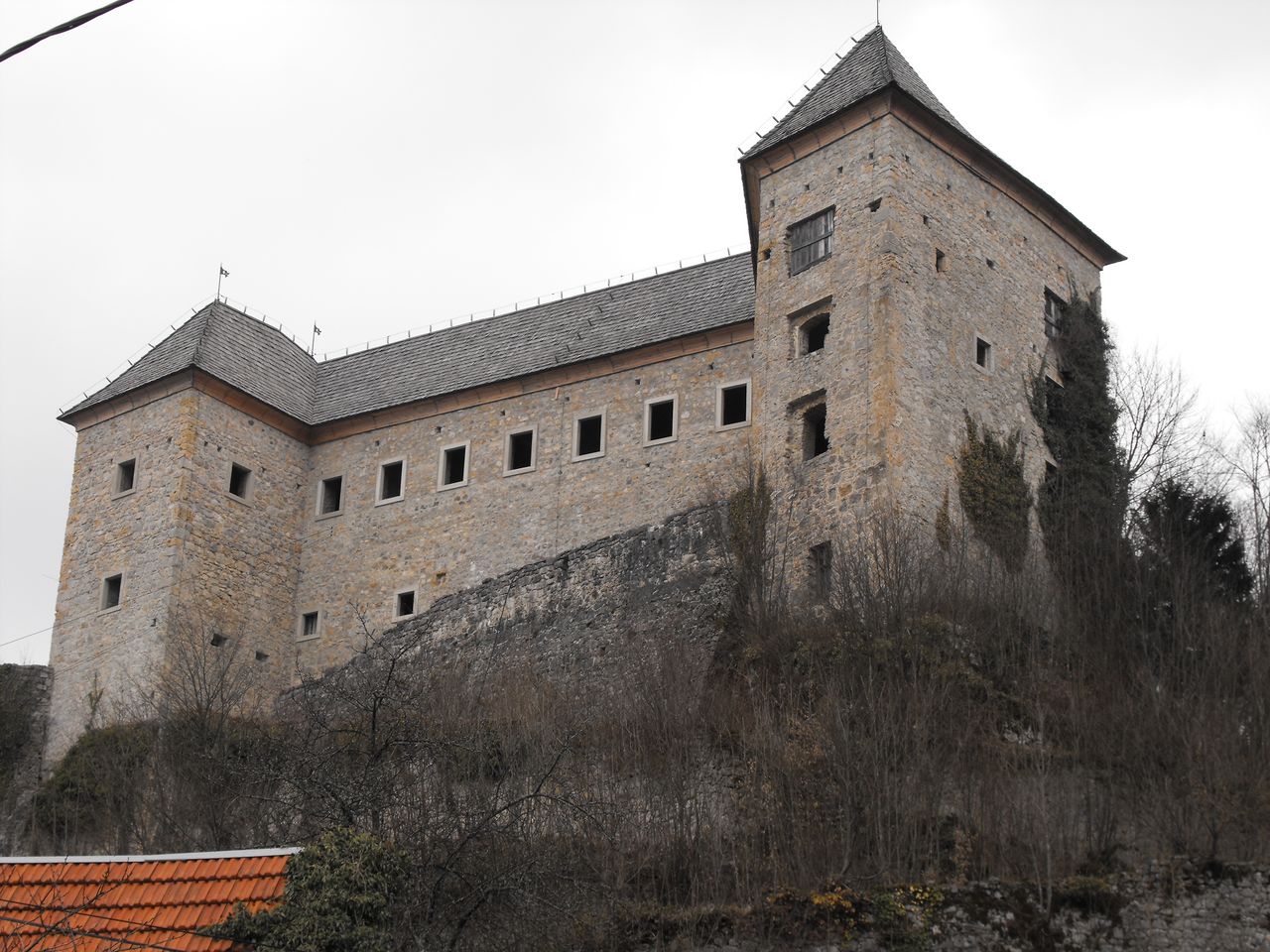 Kostel Castle on a steep hill above the Kolpa River.
Kostel Castle lies above the settlement of Kostel in south-eastern Slovenia, on a steep hill above the Kolpa River. The entire castle complex includes the castle, the settlement and the Gothic church of St. Three Kings. The castle itself forms the second largest castle complex in Slovenia, after the Celje Castle. It is also the only still-inhabited castle complex in Slovenia. Kostel Castle is an important cultural-historical monument, which opened its doors to the public in the beginning of summer of 2018, after two decades of gradual reconstruction.
Kostel Castle on a steep hill above the Kolpa River.
Kostel Castle lies above the settlement of Kostel in south-eastern Slovenia, on a steep hill above the Kolpa River. The entire castle complex includes the castle, the settlement and the Gothic church of St. Three Kings. The castle itself forms the second largest castle complex in Slovenia, after the Celje Castle. It is also the only still-inhabited castle complex in Slovenia. Kostel Castle is an important cultural-historical monument, which opened its doors to the public in the beginning of summer of 2018, after two decades of gradual reconstruction.
"asset": { "media":"", "credit":"File:Grad Kostel (logo).svg", "caption":"Caption text goes here" } } ] "date": [ { "startDate":"2,018", "endDate":"2,018", "headline":"Bi Flamenko International Flamenco Festival",
"text":"Bi Flamenko is a biennial international flamenco festival hosted and produced by Cankarjev dom, Cultural and Congress Centre in Ljubljana. It was held for the first time in February 2018, with the second edition following in February 2020. Since its inception, the festival has worked closely with Flamenco Biënnale Nederland, which takes place in the alternate years.
","asset": { "media":"", "credit":"", "caption":"Caption text goes here" } } ] "date": [ { "startDate":"2,018", "endDate":"2,018", "headline":"KAOS Festival of Contemporary Collage",
"text":"The Layer House, an urban cultural art centre in Kranj, hosted the first KAOS Festival of Contemporary Collage between June and August in 2018. The festival added another aspect to the already dynamic cultural life of the art district of Kranj, a variety of fresh approaches to different genres, visual and musical ones, but with an emphasis on contemporary collage. The events take place also at the Škrlovec tower, Mergentaler gallery and the Art district Kranj.
","asset": { "media":"", "credit":"File:KAOS Festival sodobnega kolaža (logo).svg", "caption":"Caption text goes here" } } ] "date": [ { "startDate":"2,018", "endDate":"2,018", "headline":"Embassy of the Republic of Slovenia Abu Dhabi",
"text":"The Embassy of the Republic of Slovenia in Abu Dhabi was established in 2018 when the first resident Ambassador of the Republic of Slovenia to the Emirates was appointed.
","asset": { "media":"", "credit":"", "caption":"Caption text goes here" } } ] "date": [ { "startDate":"2,018", "endDate":"2,018", "headline":"TAM-TAM Institute for Visual Culture",
"text":"Established in 2018, the TAM-TAM Institute for Visual Culture continues the activities of the company TAM-TAM, which already for 30 years has been developing the poster medium as a means of communicating in the public space. The institute encourages creativity and excellence in designing poster arts through several activities and initiatives of national importance. It aims to become a reference point for all individuals, institutions and events who deal with posters. Well known for its international poster design competition Plaktivat, TAM-TAM Institute nowadays runs three street galleries in Ljubljana, Kranj and Maribor, offering visible exhibition space to young artists and designers and bringing their creative works closer to public. With other actions and activities, the institute calls to action and exposes current social issues, sometimes bringing the solution closer as well.
","asset": { "media":"", "credit":"", "caption":"Caption text goes here" } } ] "date": [ { "startDate":"2,017", "endDate":"2,017", "headline":"Osmo/za",
"text":"Osmo/za is a collaborative space on the 8th floor of the 1960s' Avtotehna skyscraper at Slovenska 54 in the very centre of Ljubljana. It was set up in 2017 by a consortium of three NGO art/cultural producers with a rich and varied history: Ljudmila, which engages in the development and popularisation of open culture, free licences and software, and in new ways of data distribution; Delak Institute, a production house exploring post-gravity art and outlining a path for space culturalisation; and Projekt Atol Institute, whose activities range from art production to scientific research and technological prototype development and production.
","asset": { "media":"//www.culture.si/images/a/a4/Osmoza_2017_%28logo%29.svg", "credit":"File:Osmoza 2017 (logo).svg", "caption":"Caption text goes here" } } ] "date": [ { "startDate":"2,017", "endDate":"2,017", "headline":"Solafilma.si",
"text":"Solafilma.si (Film School) is a website established in 2017 by Slovenian Art Cinema Association as part of its Film Elementary School project, together with the Slovenian Cinematheque, and its project Understanding the Film. Both projects are part of the platform Development of Innovative Learning Environments and Flexible Forms of Learning for Raising General Competences in the field of culture, prepared by the Ministry of Culture of the Republic of Slovenia and the European Social Fund. The website offers a wealth of training material for elementary and secondary school professionals, videos of training courses, professional materials, a movie base and movie glossary, and a browser for film education providers who carry out film education activities throughout Slovenia.
","asset": { "media":"", "credit":"", "caption":"Caption text goes here" } } ] "date": [ { "startDate":"2,017", "endDate":"2,017", "headline":"Vzkrik Festival",
"text":"Vzkrik Festival is a festival of drama writing, which has been taking place since 2017. Every year, the festival in the form of reading performances presents seven new full-length Slovene drama texts, created as part of a cycle of playwriting workshops under the mentorship of various mentors. The festival is produced by the KUD Krik Association, Public Fund for Cultural Activities of the Republic of Slovenia and Mladinsko Theatre, with the help of project partners Trubar Literature House, Maska Institute, Prešeren Theatre Kranj, Week of Slovenian Drama and Integrali Cultural Association.
","asset": { "media":"", "credit":"", "caption":"Caption text goes here" } } ] "date": [ { "startDate":"2,017", "endDate":"2,017", "headline":"The New Post Office",
"text":"The New Post Office is the name of both a venue and a project conceived and operated jointly by the Maska Institute and Mladinsko Theatre. Located since 2017 in the premises of a former post office a short step away from the main Mladinsko building, it provides space for smaller-scale theatre performances, talks, workshops and festivals devised by the two organisations separately or in collaboration, with the express aim of exploring contemporary political and social themes through performance, dialogue and confrontation.
","asset": { "media":"", "credit":"", "caption":"Caption text goes here" } } ] "date": [ { "startDate":"2,017", "endDate":"2,017", "headline":"Maribox",
"text":"Maribox film screening centre opened in 2017 in former Kolosej Maribor multi-cinema building on the left bank of the Drava River in Maribor. It has 10 cinema halls, 3 of them being 3D screenings halls and offers 10–15 film titles a day.
","asset": { "media":"//www.culture.si/images/c/c5/Maribox_%28logo%29.svg", "credit":"File:Maribox (logo).svg", "caption":"Caption text goes here" } } ] "date": [ { "startDate":"2,017", "endDate":"2,017", "headline":"TESLA Award",
"text":"Designed to facilitate the realisation of new artworks, the TESLA Award is actually a curious mix of an award, a grant and a residency. The recipient is given not only a financial reward but also offered production and technical support, a residency space and an organised exhibition. First awarded in 2017, TESLA straddles the fields of new media and interdisciplinary arts. The award was initiated by MoTA Museum of Transitory Art as a part of the Artecitya platform, co-funded by the Creative Europe programme. In 2017, a research residency at the MoTA LAB in Ljubljana was complemented by a 6-to-8-week residency at the V2_Lab for the Unstable Media in Rotterdam.
","asset": { "media":"", "credit":"File:Nagrada TESLA (logo).svg", "caption":"Caption text goes here" } } ] "date": [ { "startDate":"2,017", "endDate":"2,017", "headline":"FAK Festival of Alternative Culture",
"text":"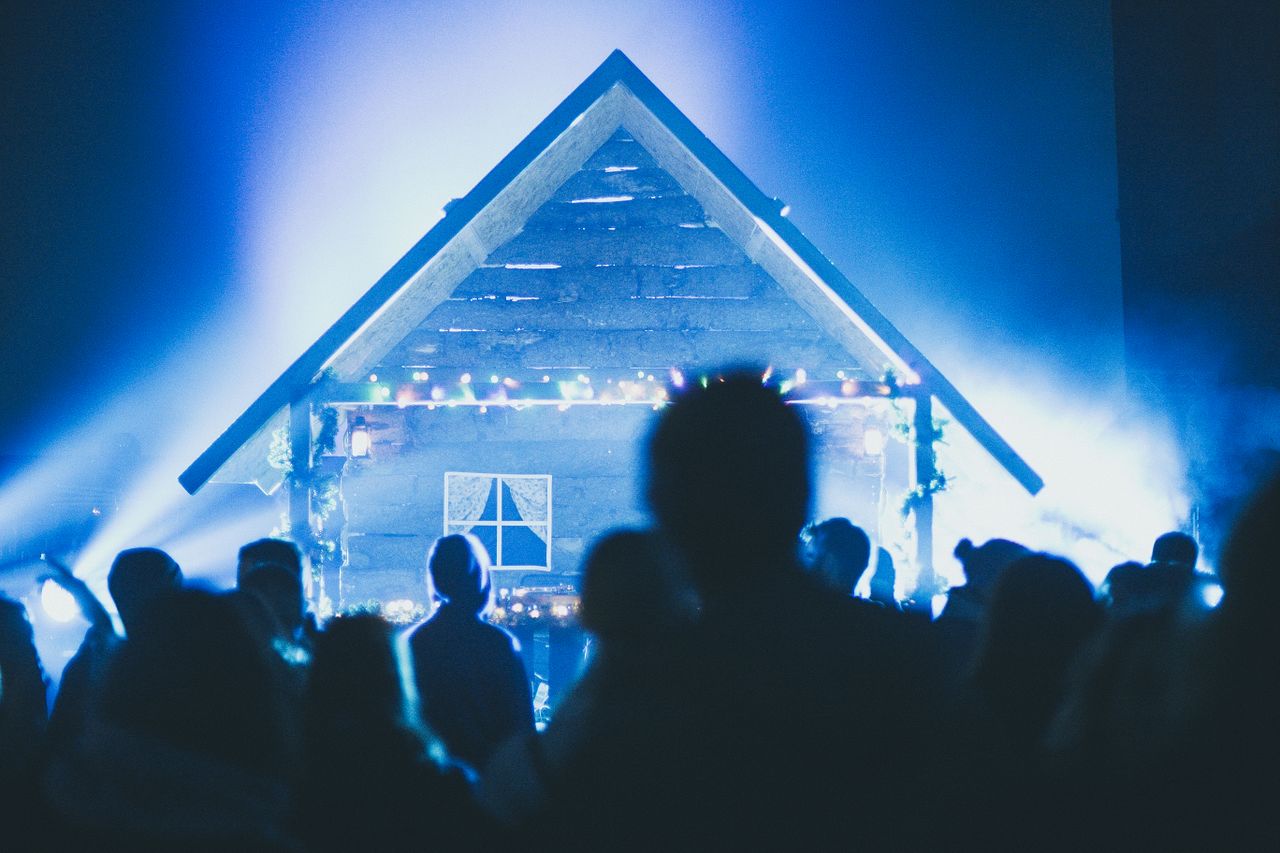 Matter and YNGFirefly performing at Kino Udarnik, FAK Festival of Alternative Culture, 2018.
The FAK Festival of Alternative Culture, launched in 2017 in the heart of the city of Maribor, combines lovers of good entertainment and alternative art forms. It takes place in December for around 10 days, mostly in the legendary Maribor cinema Kino Udarnik. Extraordinary support from local and foreign artists and high attendance have proven that Maribor is an excellent place for alternative forms of musical creativity which need their own space. The FAK platform plays an important role in the process of revitalisation of the Kino Udarnik, inspired by the lack of a diverse, urban and contemporary, high-quality cultural production in Maribor, Slovenia's second largest city.
Matter and YNGFirefly performing at Kino Udarnik, FAK Festival of Alternative Culture, 2018.
The FAK Festival of Alternative Culture, launched in 2017 in the heart of the city of Maribor, combines lovers of good entertainment and alternative art forms. It takes place in December for around 10 days, mostly in the legendary Maribor cinema Kino Udarnik. Extraordinary support from local and foreign artists and high attendance have proven that Maribor is an excellent place for alternative forms of musical creativity which need their own space. The FAK platform plays an important role in the process of revitalisation of the Kino Udarnik, inspired by the lack of a diverse, urban and contemporary, high-quality cultural production in Maribor, Slovenia's second largest city.
"asset": { "media":"", "credit":"", "caption":"Caption text goes here" } } ] "date": [ { "startDate":"2,017", "endDate":"2,017", "headline":"Fabjan Hafner Translation Award",
"text":"The Fabjan Hafner Translation Award for translation from Slovenian into German was founded in 2017 by Goethe-Institut Ljubljana, in cooperation with the Musil Institute in Klagenfurt in Austria and the Literary Colloquium Berlin. The award is named after the translator, poet and literary scholar Fabjan Hafner (1966–2016), whose work is considered extremely important in Slovenia. The award includes a one-month fellowship at the Literary Colloquium Berlin.
","asset": { "media":"//www.culture.si/images/1/18/Goethe_Institut_%28logo%29.jpg", "credit":"File:Goethe Institut (logo).jpg", "caption":"Caption text goes here" } } ] "date": [ { "startDate":"2,017", "endDate":"2,017", "headline":"Roma Station",
"text":"Roma Station is managed by the EPeKa Scientific and Research Association. It was established in 2017.
","asset": { "media":"", "credit":"", "caption":"Caption text goes here" } } ] "date": [ { "startDate":"2,017", "endDate":"2,017", "headline":"Centre for Creativity",
"text":"The Centre for Creativity or CzK (Center za kreativnost) was established in 2017 as an interdisciplinary platform to support Slovenia's cultural and creative sector (CCS). It operates under the auspices of the Museum of Architecture and Design (MAO) in Ljubljana. In 2018, a project office of CzK was also established in Maribor. The CzK platform is co-financed by the EU European Regional Development Fund and the Republic of Slovenia in the period 2017–2022.
","asset": { "media":"//www.culture.si/images/d/d6/Centre_for_Creativity_%28logo%29_vector.svg", "credit":"File:Centre for Creativity (logo) vector.svg", "caption":"Caption text goes here" } } ] "date": [ { "startDate":"2,017", "endDate":"2,017", "headline":"Flores Musicae Festival",
"text":"As a continuation of the Days of Early Music Festival which took place between Nova Gorica and Goriška Brda and was organised by Nova Gorica Arts Centre since 2012, the Flores Musicae Festival, a renewed medieval and renaissance music festival, takes place every autumn since 2017. The mission of Flores Musicae Festival is to revive medieval and Renaissance music. Its art director is a Slovene guitarist and lutenist Bor Zuljan, MA in guitar, lute, medieval music and music pedagogy at the Haute école de musique de Genève.
","asset": { "media":"", "credit":"", "caption":"Caption text goes here" } } ] "date": [ { "startDate":"2,017", "endDate":"2,017", "headline":"Cultural Garden Katzenberg",
"text":"Set in a 19th-century mansion, the Cultural Garden Katzenberg is located on the grounds of a former gun powder facility in the town of Kamnik. A multifunctional and flexible centre for artistic endeavours, Katzenberg spreads across 1800 m² with an additional enclosed garden. The garden is used for events, from theatre performances to music concerts. Indoors (with its 70 odd rooms) there is a gallery space, several offices, a library, a common room for board and video games, and several spaces rented out to various cultural producers and individual artists as studios and storage. There are also a couple of rooms meant for resident artists, all in all, the mansion is able to host about 20 people. The facility is also used as a provisional museum, temporarily storing artefacts that relate to the former gun powder factory.
","asset": { "media":"", "credit":"", "caption":"Caption text goes here" } } ] "date": [ { "startDate":"2,017", "endDate":"2,017", "headline":"Topographies of Sound Festival",
"text":"The International Sound Arts Festival Topographies of Sound – a cycle of sound performances, concerts, listening-rooms, lectures and discussions – presents contemporary, so-called electro-acoustic forms of sound arts. It emphasises the creativity of women artists, generationally, stylistically, culturally and politically diverse, who deal with new forms of sound arts. At the same time, the festival also reveals women pioneers of sound arts and electro-acoustic music of the 20th century. As Luka Zagoričnik wrote in the Odzven magazine, artistic director Nina Dragičević "introduces a new way of thinking about the landscape of art, music and sound with the choice of women artists and the issues that the festival opens".
","asset": { "media":"", "credit":"", "caption":"Caption text goes here" } } ] "date": [ { "startDate":"2,017", "endDate":"2,017", "headline":"4th Dritl Virtual Museum",
"text":"4th Dritl is a physical and virtual mining museum established as part of Delavski dom Trbovlje Cultural Centre in 2017. The museum provides guided tours through a reconstructed coal mine containing original mining equipment, enhanced with video, 3D animation, hologram and VR technology. In 2019 it added a mine-escape challenge ("Pobeg iz rudnika") in which visitors compete against the clock to rescue a group of trapped miners.
","asset": { "media":"", "credit":"", "caption":"Caption text goes here" } } ] "date": [ { "startDate":"2,017", "endDate":"2,017", "headline":"Minoriti Summer Open Air Cinema",
"text":"The Minoriti Summer Open Air Cinema is an annual summer film event, established in 2017, focusing on the best films of the year in the field of art cinema, documentaries, Slovenian film, film premieres and short films. It takes place at the open air auditorium of the Maribor Puppet Theatre in Maribor during July and August, usually every Saturday and Wednesday evening. The event instantly became popular and is attracting around 4,000 visitors every year. Half of the programme is usually screened with English subtitles or in English language.
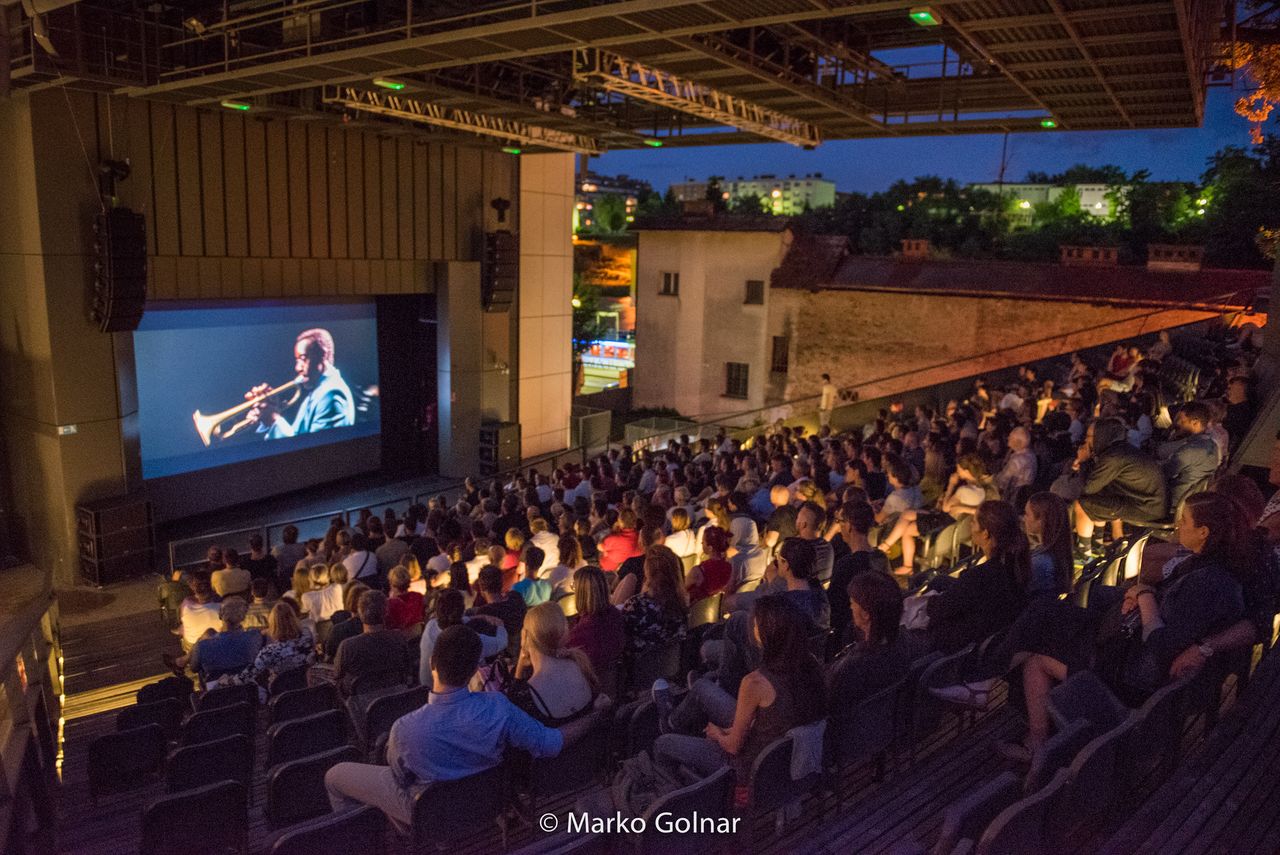 Screening of the film Miles Ahead, an American biographical drama that interprets the life and compositions of jazz musician Miles Davis, at the Minoriti Open Air Cinema, 2017.
Screening of the film Miles Ahead, an American biographical drama that interprets the life and compositions of jazz musician Miles Davis, at the Minoriti Open Air Cinema, 2017.
"asset": { "media":"//www.culture.si/images/d/dc/Minoriti_Open_air_Cinema_%28logo%29.svg", "credit":"File:Minoriti Open air Cinema (logo).svg", "caption":"Caption text goes here" } } ] "date": [ { "startDate":"2,017", "endDate":"2,017", "headline":"Švicarija Art Centre",
"text":"Occupying the premises of a renovated, early 20th-century hotel, Švicarija Art Centre is a newly established arts venue in Ljubljana. Opening its doors in May 2017, it is managed by the International Centre of Graphic Arts, situated in its immediate vicinity – in the very heart of Ljubljana's Tivoli Park.
Set out to be a multi-purpose venue, Švicerija – with its 2 living and 3 residency apartments alongside a dozen production spaces – is foremost meant for resident and visiting artists. However, there is also an exhibition space as well as a cafeteria.
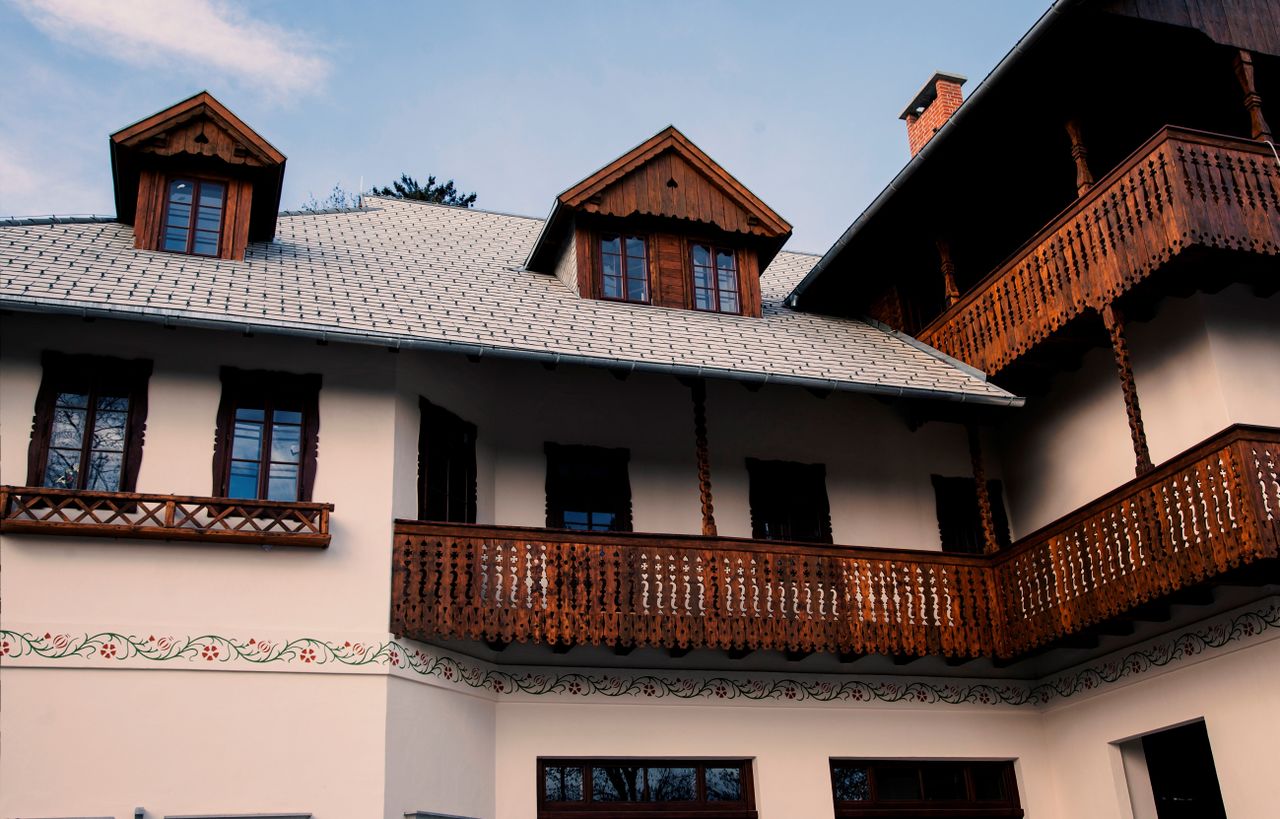 The renovated exterior of Švicarija Art Centre, a new residency and exhibition venue for visual arts reopened in 2017.
The renovated exterior of Švicarija Art Centre, a new residency and exhibition venue for visual arts reopened in 2017.
"asset": { "media":"", "credit":"File:Ustvarjalni center Švicarija (logo).svg", "caption":"Caption text goes here" } } ] "date": [ { "startDate":"2,017", "endDate":"2,017", "headline":"Centre of Slavic Cultures France Prešeren",
"text":"The Centre of Slavic Cultures France Prešeren organises various cultural events, thematic evenings, festivals, workshops, concerts of various music genres, from jazz and acoustics to metal and trap, theatre performances, improvisation theatre and stand-up evenings, exhibitions and children's events, literary and poetry readings. Located in the legendary KUD France Prešeren building in the Ljubljana neighbourhood Trnovo, the centre – established in 2017 – continues an over century-long tradition of hosting various cultural and artistic events.
","asset": { "media":"//www.culture.si/images/a/a7/Centre_of_Slavic_Cultures_France_Pre%C5%A1eren_%28logo%29.jpg", "credit":"File:Centre of Slavic Cultures France Prešeren (logo).jpg", "caption":"Caption text goes here" } } ] "date": [ { "startDate":"2,017", "endDate":"2,017", "headline":"Fantasy Literature Festival Fanfest",
"text":"Fanfest is an international festival of fantasy literature, which has been taking place in Celje, in the third largest Slovene city, located in the region of Štajerska (Slovenian Styria). The festival has been running since 2017 and is organized by Celje’s Literary Society. It is the first and still the only literary festival of its kind in Slovenia, set as a multi-day, international literary event for authors and lovers of fantasy literature. Most of the events are aimed at the general public, but some activities, such as workshops, are for authors only.
","asset": { "media":"", "credit":"", "caption":"Caption text goes here" } } ] "date": [ { "startDate":"2,016", "endDate":"2,016", "headline":"Kinotrip",
"text":"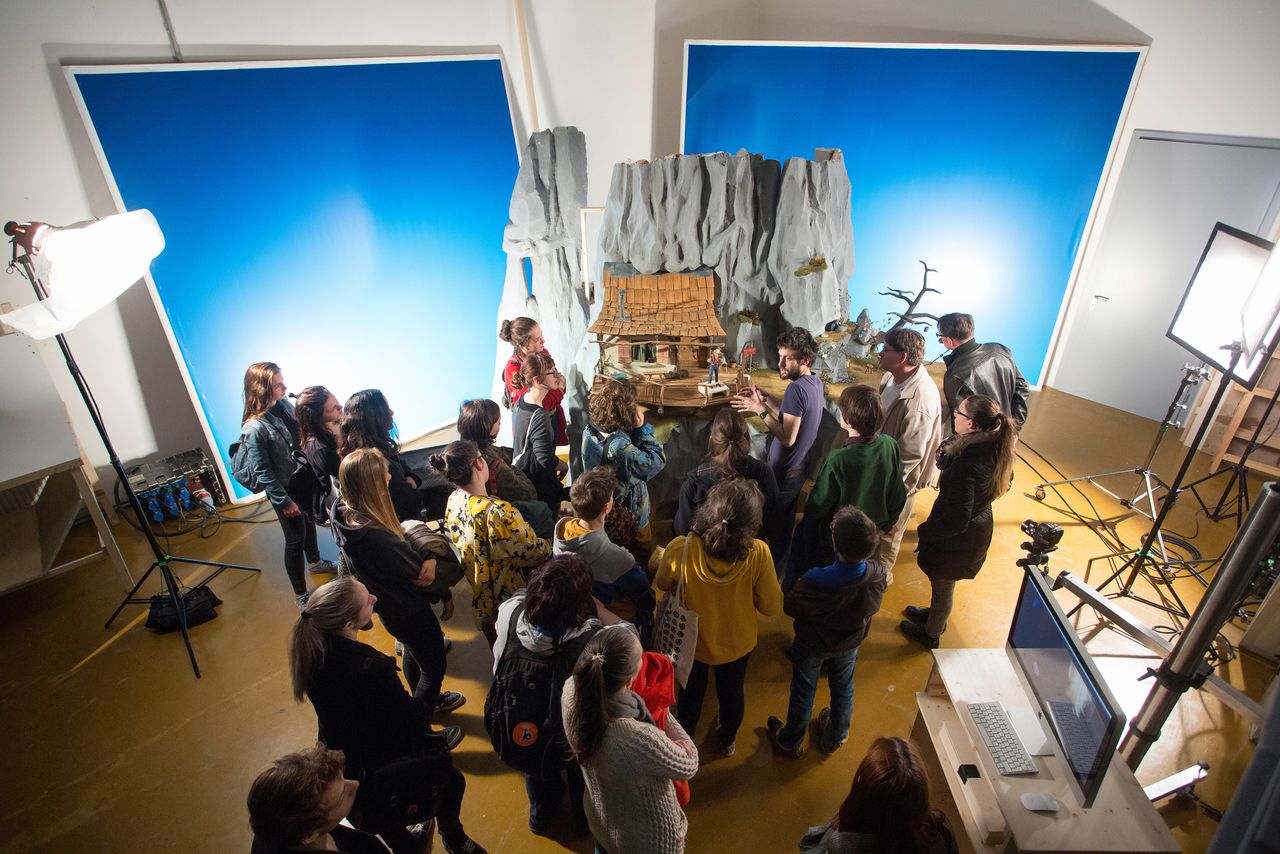 Kinotrip animation workshop, 2016
Established in 2016, Kinotrip is at the same time a festival, a film club and a year long programme at Kinodvor Cinema. Comprised of a set of interactive activities, it is aimed at socialising youth above 14 years into a quality and diverse cinema culture. As such, it is mainly also run and programmed by young people from the same age group that it addresses.
Kinotrip animation workshop, 2016
Established in 2016, Kinotrip is at the same time a festival, a film club and a year long programme at Kinodvor Cinema. Comprised of a set of interactive activities, it is aimed at socialising youth above 14 years into a quality and diverse cinema culture. As such, it is mainly also run and programmed by young people from the same age group that it addresses.
"asset": { "media":"//www.culture.si/images/9/92/Kinotrip_%28logo%29.jpg", "credit":"File:Kinotrip (logo).jpg", "caption":"Caption text goes here" } } ] "date": [ { "startDate":"2,016", "endDate":"2,016", "headline":"Planica Museum",
"text":"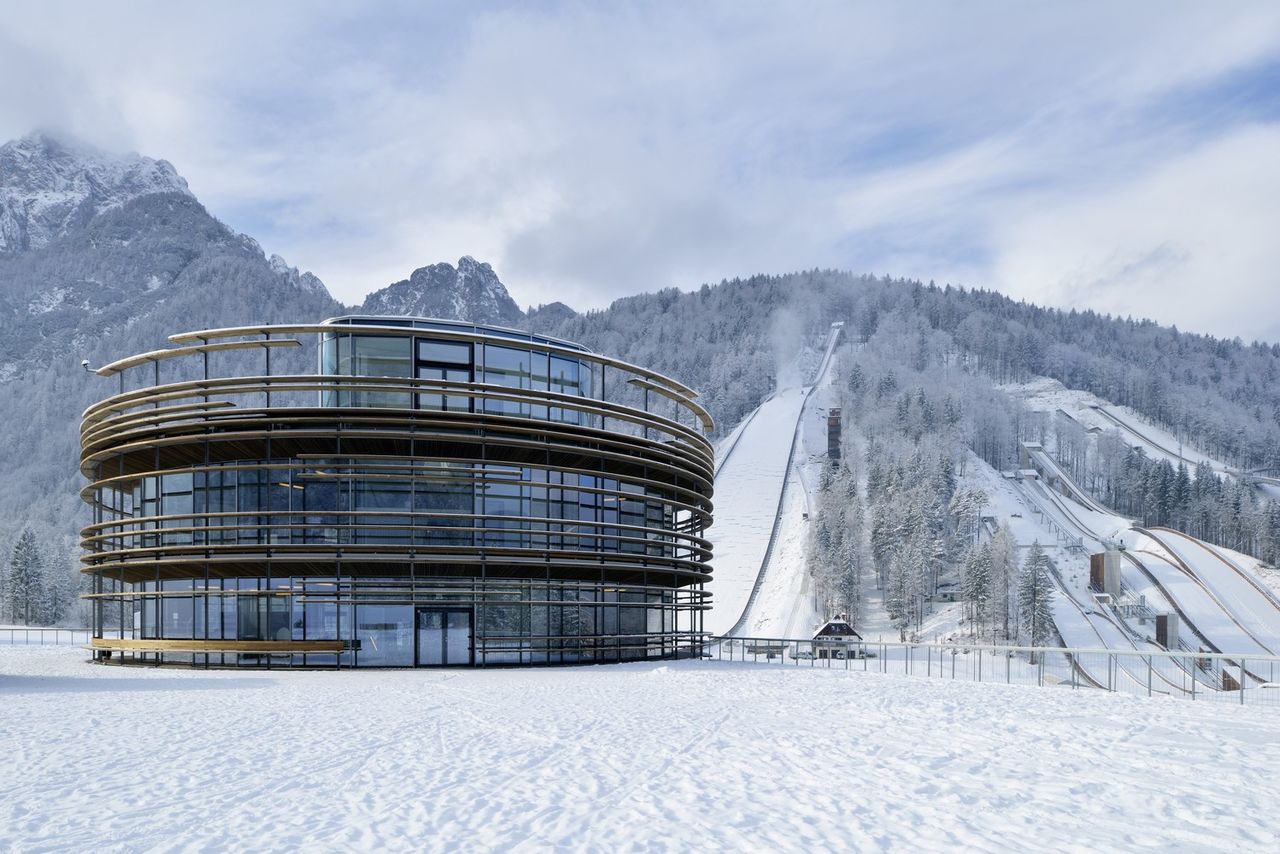 The pavilion and the ski fly hills at the Nordic Centre Planica. The pavilion was conceived by STVAR architects, 2016.
The Planica Museum is dedicated to the history of ski jumping and flying in Planica, an alpine valley in northwestern Slovenia. Historically, this valley has been one of the prime sites for the development of ski flying as a sports discipline of its own, and consequently, the museum also presents the wider history of ski jumping as such. Nevertheless, its main focus is to present and develop both the cultural as well as the technical heritage of almost a century of ski jumping in Planica.
At the end of 2015, the Nordic Centre Planica was completed and inaugurated. It is a modern Nordic skiing complex that boasts eight newly built or renovated ski jumping and flying hills and caters to cross-country skiing and various summer activities. The three bureaus that handled the architectural dimensions of the project are: A.biro (ski jumps and bridges), STVAR Architects (service and performance buildings, pavilion) and Studio AKKA (landscape, including the lay-out of infrastructure and cross country lanes).
Set in a newly constructed pavilion as a part of the Nordic skiing complex called the Nordic Centre Planica, the Planica Museum opened its doors in 2016.
The pavilion and the ski fly hills at the Nordic Centre Planica. The pavilion was conceived by STVAR architects, 2016.
The Planica Museum is dedicated to the history of ski jumping and flying in Planica, an alpine valley in northwestern Slovenia. Historically, this valley has been one of the prime sites for the development of ski flying as a sports discipline of its own, and consequently, the museum also presents the wider history of ski jumping as such. Nevertheless, its main focus is to present and develop both the cultural as well as the technical heritage of almost a century of ski jumping in Planica.
At the end of 2015, the Nordic Centre Planica was completed and inaugurated. It is a modern Nordic skiing complex that boasts eight newly built or renovated ski jumping and flying hills and caters to cross-country skiing and various summer activities. The three bureaus that handled the architectural dimensions of the project are: A.biro (ski jumps and bridges), STVAR Architects (service and performance buildings, pavilion) and Studio AKKA (landscape, including the lay-out of infrastructure and cross country lanes).
Set in a newly constructed pavilion as a part of the Nordic skiing complex called the Nordic Centre Planica, the Planica Museum opened its doors in 2016.
"asset": { "media":"", "credit":"File:Planiški muzej (logo).svg", "caption":"Caption text goes here" } } ] "date": [ { "startDate":"2,016", "endDate":"2,016", "headline":"GalerijaGallery",
"text":"GalerijaGallery is a small gallery space set in the Šiška Cultural Quarter in Ljubljana, located on the 6th floor of the former municipality building on Trg prekomorskih brigad 1 in Šiška. It was established by artists Viktor Bernik, Žiga Kariž and Jara Vogrič in 2016, and is run under the auspices of the "Made in China" project. Its programming policy centres around different and uncompromising inquiries into contemporary art taken by either local or foreign artists. GalerijaGallery also sells artworks, especially the so-called "artist's multiples", an endeavour pursued by Made in China. In line with the latter's creed, the gallery's promotional strategies tend to follow unorthodox ways of inviting visitors.
","asset": { "media":"", "credit":"", "caption":"Caption text goes here" } } ] "date": [ { "startDate":"2,016", "endDate":"2,016", "headline":"Marko Hatlak Band",
"text":"Marko Hatlak Band is yet another of expression of the multifaceted accordion virtuoso, Marko Hatlak. Venturing into the territories of funk, pop, latin music and jazz, the band merges them with Hatlak's signature tango and baroque sensibilities. Among the source materials reworked by the band one can find tunes by musicians such as Jamiroquai, Michael Jackson, Stevie Wonder, Phill Collins, Prince – and Astor Piazzolla. This rhythmically driven project was founded in 2016, and is led by Marko Hatlak on accordion and vocals. The other members, all of them renowned musicians, are Blaž Jurjevčič (keyboards), Žiga Kožar (drums), Tadej Kampl (bass), Lenart Krečič (tenor saxofon), Tomaž Gajšt (trumpet) and Lazaro Amed Hierrezuelo Zumeta (percussion and violin).
","asset": { "media":"", "credit":"", "caption":"Caption text goes here" } } ] "date": [ { "startDate":"2,016", "endDate":"2,016", "headline":"DobraVaga",
"text":"Foremost a sales gallery for visual arts, DobraVaga is simultaneously also an exhibition space and an art studio. Set in Ljubljana's central marketplace and overlooking the Ljubljanica River (the entire complex was designed by the famed architect Jože Plečnik), DobraVaga opened its doors in 2016. Run by the Kino Šiška Centre for Urban Culture, the space focuses on artists of the younger generation and deals in a variety of art forms – from paintings, illustration and graphic design to artist's multiples, artist's books and zines.
","asset": { "media":"//www.culture.si/images/4/44/DobraVaga_%28logo%29.svg", "credit":"File:DobraVaga (logo).svg", "caption":"Caption text goes here" } } ] "date": [ { "startDate":"2,016", "endDate":"2,016", "headline":"Indigo Festival",
"text":"Indigo Festival – an international festival of contemporary ideas – is a festival platform for the latest trends in art, culture, media, music, film, theatre and design. Taking place annually in Ljubljana since 2016, it brings together cultural producers in the Ljubljana quarter surrounded by Križevniška Street, French Revolution Square, Gosposka Street, New Square, Breg and Salendrova Street, where important Slovene cultural institutions are located, such as the Museum and Galleries of Ljubljana, Mini Theatre, the Scientific Research Centre (ZRC SAZU), Slovene Academy of Science and Arts, Festival Ljubljana, the Secondary School for Design and Photography, Ljubljana and the National and University Library. The festival aims to connect these cultural and scientific institutions with non-governmental organisations and creative individuals. Every year, the programme connects the rich artistic heritage of this neighbourhood with cultural creation and theoretical reflection on contemporary society. The festival takes place throughout the very quarter, in both the institutions and outdoors on the city streets.
","asset": { "media":"", "credit":"", "caption":"Caption text goes here" } } ] "date": [ { "startDate":"2,016", "endDate":"2,016", "headline":"Shots International Short Film Festival",
"text":"Shots International Short Film Festival was launched in 2016 in Slovenj Gradec, a town in northern Slovenia, by a young and ambitious team of film, media, and tourism professionals. It screens a diverse program of short films from all over the world on three evenings at the Rotenturn courtyard open-air venue in the center of the town. The applications for eligible films are usually open from August until May.
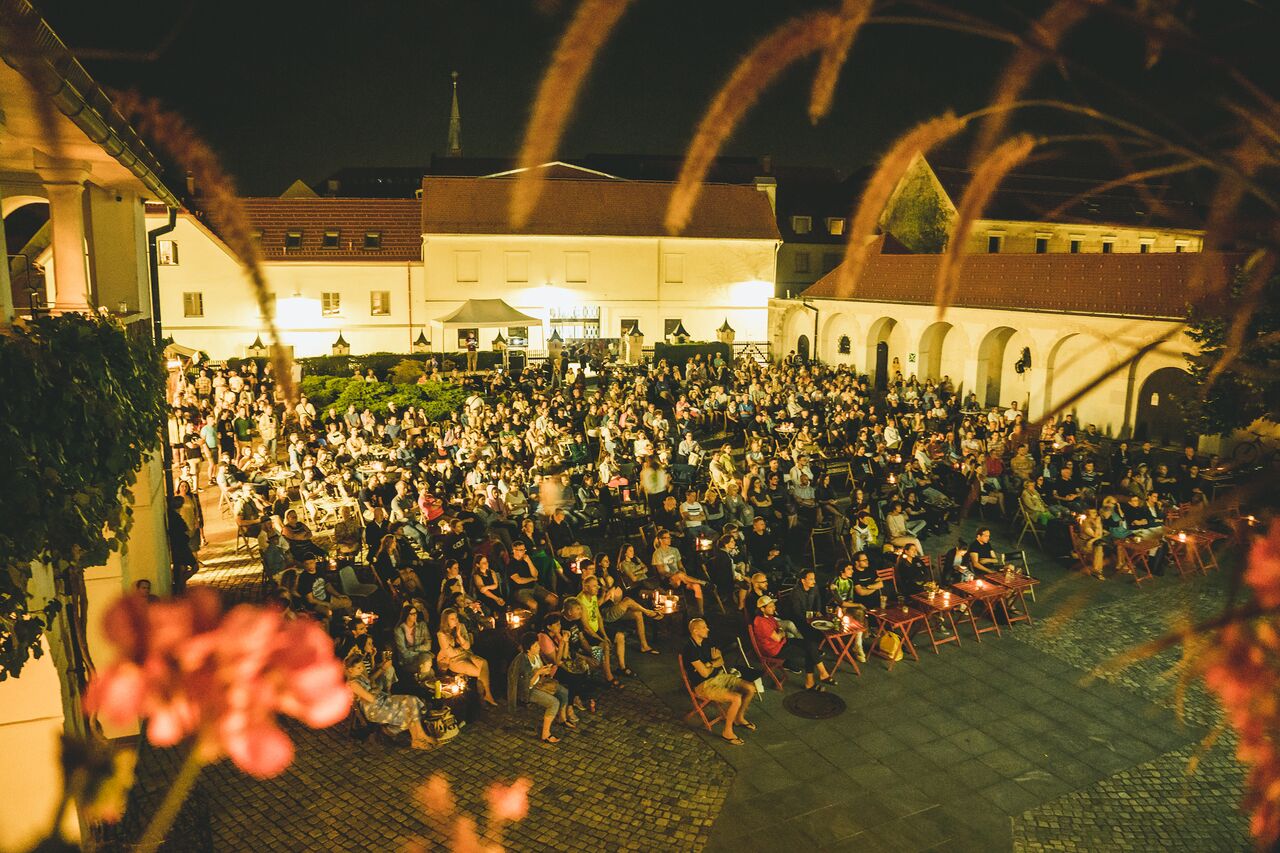 Shots International Short Film Festival, Rotenturn Castle in Slovenj Gradec, 2022. Photo: Nika Hölcl
Shots International Short Film Festival, Rotenturn Castle in Slovenj Gradec, 2022. Photo: Nika Hölcl
"asset": { "media":"//www.culture.si/images/6/6b/SHOTS2024_logotip.jpg", "credit":"File:SHOTS2024 logotip.jpg", "caption":"Caption text goes here" } } ] "date": [ { "startDate":"2,016", "endDate":"2,016", "headline":"Arts Academy of the University of Nova Gorica",
"text":"Founded in 2016, the Arts Academy of the University of Nova Gorica is one of the four academies in Slovenia. It is the first one to be established after 1945, and also the only one outside of Ljubljana. Its educational programme complements the other three establishments, differing from them as being distinctively interdisciplinary – its primary focuses are video, animation, photography and new media art. As a novel educational institution, this academy strives to be an active, not only research- but also production-oriented, academic environment. The academy is located in the spatial Alvarez Palace in the centre of Gorizia, Nova Gorica's twin town across the Slovenian-Italian border. This provides for an international environment and enables in-depth cross-border cooperation.
","asset": { "media":"", "credit":"", "caption":"Caption text goes here" } } ] "date": [ { "startDate":"2,016", "endDate":"2,016", "headline":"Intimate Cinema, GT22",
"text":"The Intimate Cinema, GT22 is a cinema space established in 2016 that runs 2 to 4 times monthly at the independent theatre Intimate Stage, GT22 in the interdisciplinary art laboratory GT22 in Maribor. It focuses on art and Slovenian cinema, documentary, experimental, animated and short films. Film screenings are usually accompanied by artist and expert talks on film, arts, humanities and other connected subjects.
","asset": { "media":"", "credit":"", "caption":"Caption text goes here" } } ] "date": [ { "startDate":"2,016", "endDate":"2,016", "headline":"SKICA Berlin, Slovenian Cultural Centre",
"text":"The Slovenian Cultural Centre in Berlin (Slowenisches Kulturzentrum, or SKICA Berlin) was set up in June 2016, it operates at the Embassy of the Republic of Slovenia Berlin with the aim to become a central forum and a representative of Slovene cultural activities in Germany as well as a catalyst of new international projects.
","asset": { "media":"", "credit":"File:Slowenisches Kulturzentrum / Slovenski kulturni center v Berlinu / SKICA Berlin (logo).svg", "caption":"Caption text goes here" } } ] "date": [ { "startDate":"2,016", "endDate":"2,016", "headline":"Consulate of the Republic of Slovenia Oslo",
"text":"The Embassy of the Republic of Slovenia in Copenhagen is an official representative body of the Slovene Government to the Kingdom of Norway as well as the Republic of Iceland, Kingdom of Sweden, and the Republic of Finland. In May 2016 the Slovenian government established the Consulate of the Republic of Slovenia in Oslo. Other diplomatic representatives of the Republic of Slovenia in Scandinavia include consulates in Oslo, Denmark, Iceland, and Sweden.
","asset": { "media":"", "credit":"", "caption":"Caption text goes here" } } ] "date": [ { "startDate":"2,016", "endDate":"2,016", "headline":"Art club & cafe Wetrinsky",
"text":"Opening its doors at the end of 2016, the Art club & cafe Wetrinsky is possibly the only club of its sort currently operating in Maribor. Stationed in the premises of the Vetrinjski dvor mansion and previously only sporadically used, the place became a fully-fledged bar and club under the auspices of the social enterprise called the PERON cooperative. This crew was also responsible for the Salon of Applied Arts.
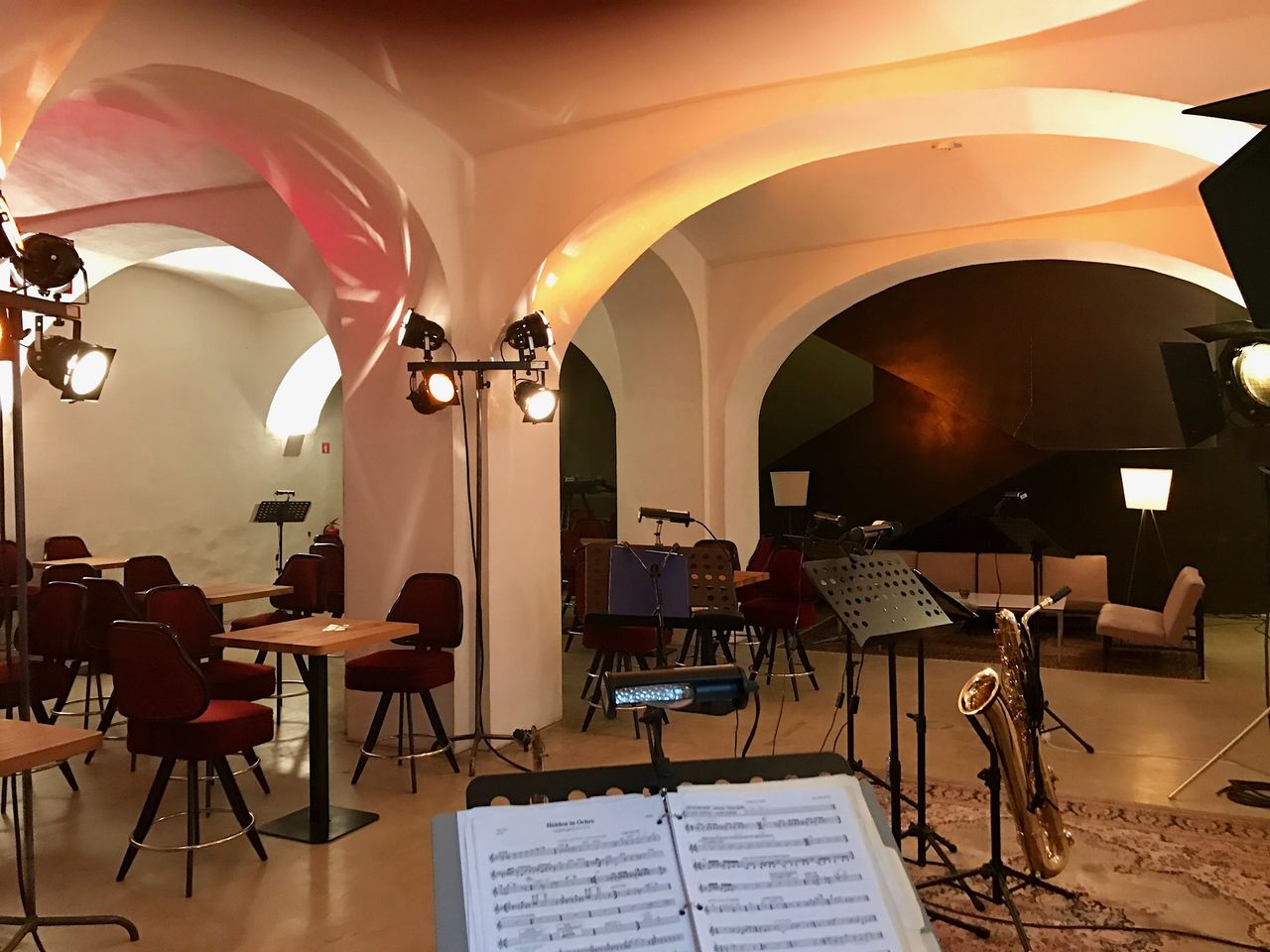 The stage of Art club & cafe Wetrinsky is open to a varied set of musicians, from jazz and rock to hip hop acts, 2017
The stage of Art club & cafe Wetrinsky is open to a varied set of musicians, from jazz and rock to hip hop acts, 2017
"asset": { "media":"", "credit":"", "caption":"Caption text goes here" } } ] "date": [ { "startDate":"2,016", "endDate":"2,016", "headline":"Ljubljanica River Exhibition",
"text":"The Ljubljanica River Exhibition is dedicated to the natural and cultural heritage of the Ljubljanica River and its immediate surroundings. It is located in the town of Vrhnika, where this fascinating river has several of its many springs. The exhibition covers the period of the last 40,000 years, starting with a replica of the wooden arrowhead found here and presumably used by the Neanderthals. Many of the artefacts presented were found in the Ljubljana Moors, whose prehistoric pile dwellings legacy is included in the the UNESCO World Heritage List.
Established in 2016, this small and contemporary exhibition is managed by the City Museum of Ljubljana. It occupies the ground floor of the Vrhnika Cultural Centre, a multifunctional venue situated at the edge of the town centre.
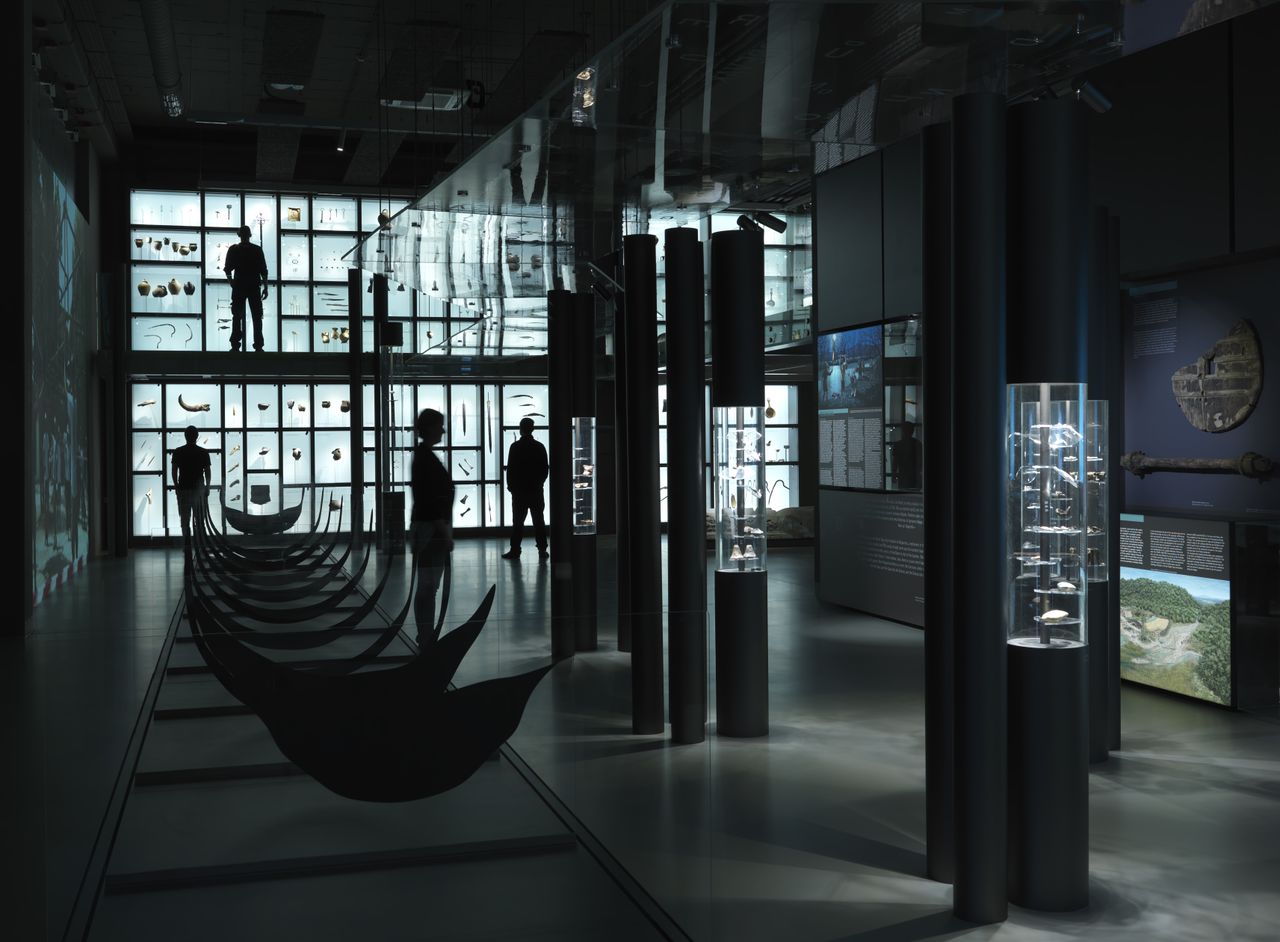 The Ljubljanica River Exhibition display, focusing of the prehistoric heritage, 2016
The Ljubljanica River Exhibition display, focusing of the prehistoric heritage, 2016
"asset": { "media":"//www.culture.si/images/f/f8/Ljubljanica_River_Exhibition_%28logo%29.svg", "credit":"File:Ljubljanica River Exhibition (logo).svg", "caption":"Caption text goes here" } } ] "date": [ { "startDate":"2,016", "endDate":"2,016", "headline":"Maribor Is The Future podcast",
"text":"Maribor Is The Future podcast is an arts and culture podcast, established in 2016 in GT22. It produces podcasts about different subjects: film, theatre, visual arts, photography, local topics, urban gardening, ecology, sports and music. It features also a separate Abonma series, which comments live with guests on theatre plays, which are part of the Maribor Theatre Festival, Week of Slovenian Drama and Days of Comedy. The podcasts are recorded in Slovene, English and Croatian language and are also frequently aried at Mariborski radio Študent (MARŠ) on mondays at 10 PM.
","asset": { "media":"", "credit":"", "caption":"Caption text goes here" } } ] "date": [ { "startDate":"2,016", "endDate":"2,016", "headline":"Vladimir Kralj Award",
"text":"The Vladimir Kralj Award for high-quality research work in the field of theatre has been awarded on the occasion of the annual Week of Slovenian Drama at the Prešeren Theatre Kranj since 2016, in cooperation with the Association of Theatre Critics and Researchers of Slovenia. The award is named after Vladimir Kralj (1901–1969) Slovene theatre and literary critic, drama theoretician, and writer.
","asset": { "media":"", "credit":"File:Nagrada Vladimirja Kralja (logo).svg", "caption":"Caption text goes here" } } ] "date": [ { "startDate":"2,016", "endDate":"2,016", "headline":"Kranjska Gora International Film Festival",
"text":"The Kranjska Gora International Film Festival, the essence of which is to bring together film makers and motion picture lovers, projected its first films in 2016 in the beautiful environment of the eponymous mountain village Kranjska Gora. In a rich and diverse ten-day programme, which takes place every year at the end of July and beginning of August, the festival offers international and local documentary and fiction films of all kinds and genres as well as a diverse accompanying programme, workshops for children, workshops and master classes for adult film lovers, round tables with authors, theatre performances and concerts. In an interview for the daily newspaper Delo, the founder and art director of the festival Matjaž Javšnik said he wanted "Kranjska Gora to be presented as a cultural and not just a sports destination".
","asset": { "media":"", "credit":"", "caption":"Caption text goes here" } } ] "date": [ { "startDate":"2,016", "endDate":"2,016", "headline":"Filmoteka Institute for Promotion of Film Culture",
"text":"A non-governmental organisation Filmoteka Institute for Promotion of Film Culture was founded in 2016 by a group of film professionals from the field of filmmaking, film theory, restoration and archiving who strive at sharing the knowledge on Slovenian film as well as broader AV production, setting up projects that improve the accessibility of the related data and materials. Filmoteka team has launched the portal Slovenian Film Database in 2020 in cooperation with the Slovenian Film Centre. They are involved in the Slovenian Cinematheque's project Zgodbe iz omare, collecting the 16mm, 8mm and Super 8mm amateur and home movie films. On 18 May 2019 the 1st Day of the Home Movie took place in the Cinematheque.
","asset": { "media":"//www.culture.si/images/2/26/Filmoteka_%28logo%29.svg", "credit":"File:Filmoteka (logo).svg", "caption":"Caption text goes here" } } ] "date": [ { "startDate":"2,016", "endDate":"2,016", "headline":"Festival of Photography Maribor",
"text":"The Festival of Photography Maribor is an international festival of photography, founded in 2016. Comprised of various photography exhibitions as well as lectures, discussions and even multimedia displays, the festival is organised by Photoclub Maribor. It takes place in the city of Maribor, utilising many of its gallery spaces, among them the Media Nox Gallery, the Gallery K18, the Maribor Synagogue, the DLUM Gallery, the Stolp Photogallery, Vetrinjski dvor, the Photography Museum Maribor, the Epeka Gallery, the University of Maribor Library and GT22.
","asset": { "media":"", "credit":"", "caption":"Caption text goes here" } } ] "date": [ { "startDate":"2,016", "endDate":"2,016", "headline":"White Aphroid Award",
"text":"The White Aphroid Award was an award series that ran from 2016 to 2019 under the umbrella of Risk Change, an interdisciplinary arts, education and audience development project led and coordinated by KIBLA Multimedia Centre in Maribor. This large-scale cooperation project, which received nearly 1.6 million euros in funding from Creative Europe, was also supported by the Slovenian Ministry of Culture and the Municipality of Maribor.
","asset": { "media":"", "credit":"File:Nagrada Beli Aphroid (logo).svg", "caption":"Caption text goes here" } } ] "date": [ { "startDate":"2,016", "endDate":"2,016", "headline":"0.1 Institute",
"text":"The 0.1 Institute, founded in 2016, is a creative and conceptual platform for research into and the production of contemporary art practice and theory, with a particular focus on movement as it pertains to the performing (dance, puppetry, physical theatre) and non-performing (film, visual arts, music, intermedia) arts.
Concept
While at first glance it retains all the features of a contemporary dance company, particularly for an audience perhaps unaware of the institute's theoretical underpinnings, the professional profiles of the three main players show the wider perspectives they are keen to bring to movement: Jernej Bizjak is a contemporary dancer, choreographer and teacher; Sara Živkovič Kranjc, a scriptwriter and producer; and Klemen Janežič, an actor and director. The institute's commitment to research and to an interdisciplinary approach is exemplified by Za Ludwiga (For Ludwig), an ongoing project developed in Denmark to coincide with the 250th anniversary of Beethoven's birth in 2020.","asset": { "media":"", "credit":"", "caption":"Caption text goes here" } } ] "date": [ { "startDate":"2,016", "endDate":"2,016", "headline":"City of Books Festival",
"text":"City of Books Festival is an urban book festival that has been taking place in the centre of Nova Gorica, a city on the western border of Slovenia, since 2016. It is the largest literary event in the Goriška region, centred mostly in two one-week book fairs, at the end of spring and in December, with about 30 events in a week, and is intended for all book lovers and everyone else who is interested in current topics and would like to discuss them. Those who are looking for relaxation at quality music concerts also find their place. The festival is organized by the Goriška Humanist Association.
","asset": { "media":"", "credit":"", "caption":"Caption text goes here" } } ] "date": [ { "startDate":"2,016", "endDate":"2,016", "headline":"Creative Jazz Clinic Velenje",
"text":"Creative Jazz Clinic Velenje is a series of workshops and masterclasses started in 2016 by Slovenian musician, teacher and Prešeren Award recipient Jure Pukl, who was raised in the town and is widely regarded as one of the best young saxophonists in the world. The huge roster of musicians with whom he has collaborated over the last two decades means that Pukl has been able to attract many top names from the world of jazz to teach and perform at the clinic, which generally takes places over five days at the end of February. Although he has lived in New York City since 2013, Pukl continues to take a keen interest in the jazz scene in his homeland, and was also instrumental in reviving the Max Club Jazz Festival in 2012 after a hiatus of ten years.
","asset": { "media":"", "credit":"", "caption":"Caption text goes here" } } ] "date": [ { "startDate":"2,016", "endDate":"2,016", "headline":"Jazz Velenje Cultural Association",
"text":"Jazz Velenje Cultural Association was founded in 2016 by Velenje native Jure Pukl, who is widely regarded as one of the best jazz saxophonists in the world. Although resident in New York City since 2013, he continues to play an active part in the Slovenian jazz scene, particularly through Creative Jazz Clinic Velenje, a five-day series of workshops, masterclasses and performances held every February since 2016. The clinic is organised jointly by the association, Velenje Festival and the Fran Korun Koželjski Music School, where the workshops and masterclasses take place, and supported by the Municipality of Velenje.
","asset": { "media":"", "credit":"", "caption":"Caption text goes here" } } ] "date": [ { "startDate":"2,016", "endDate":"2,016", "headline":"LILA Landezine International Landscape Award",
"text":"In 2016, Landezine, a society for promotion of landscape architecture located in Ljubljana, expanded its network and empowered its voice in the global community by launching a series of international symposiums Landezine LIVE and LILA Landezine International Landscape Award. At that time, the LILA Award was the only international award in the world that did not reward individual projects, but rather the landscape architecture collectives and individuals for their approach to creating an open space.
","asset": { "media":"", "credit":"File:LILA Mednarodna nagrada za krajinsko arhitekturo Landezine (logo).svg", "caption":"Caption text goes here" } } ] "date": [ { "startDate":"2,016", "endDate":"2,016", "headline":"Tomaž Šalamun Poetry Centre",
"text":"The Tomaž Šalamun Poetry Centre is simultaneously a library, memorial room, study facility and multipurpose event space dedicated to poetry and literature. It was established in 2016, 2 years after the departure of possibly the most influential contemporary Slovene poet, Tomaž Šalamun (1941–2014). The poetry centre contains his entire book collection, donated posthumously by his wife.
Stationed at the premises of the Public Fund for Cultural Activities in the centre of Ljubljana, the centre itself was designed by Dekleva Gregorič Arhitekti.
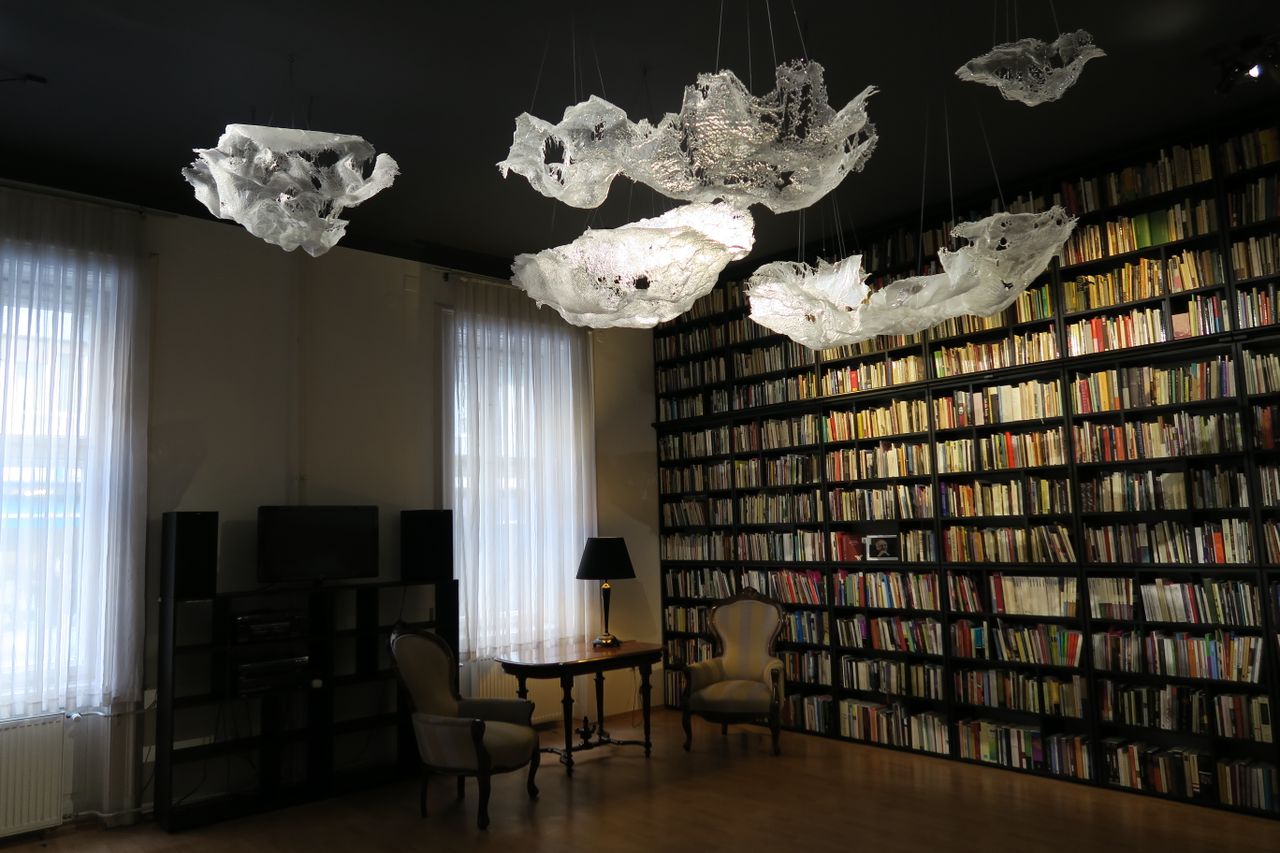
"asset": { "media":"//www.culture.si/images/5/59/Toma%C5%BE_%C5%A0alamun_Poetry_Centre_%28logo%29.svg", "credit":"File:Tomaž Šalamun Poetry Centre (logo).svg", "caption":"Caption text goes here" } } ] "date": [ { "startDate":"2,016", "endDate":"2,016", "headline":"Liszt Institute Ljubljana",
"text":"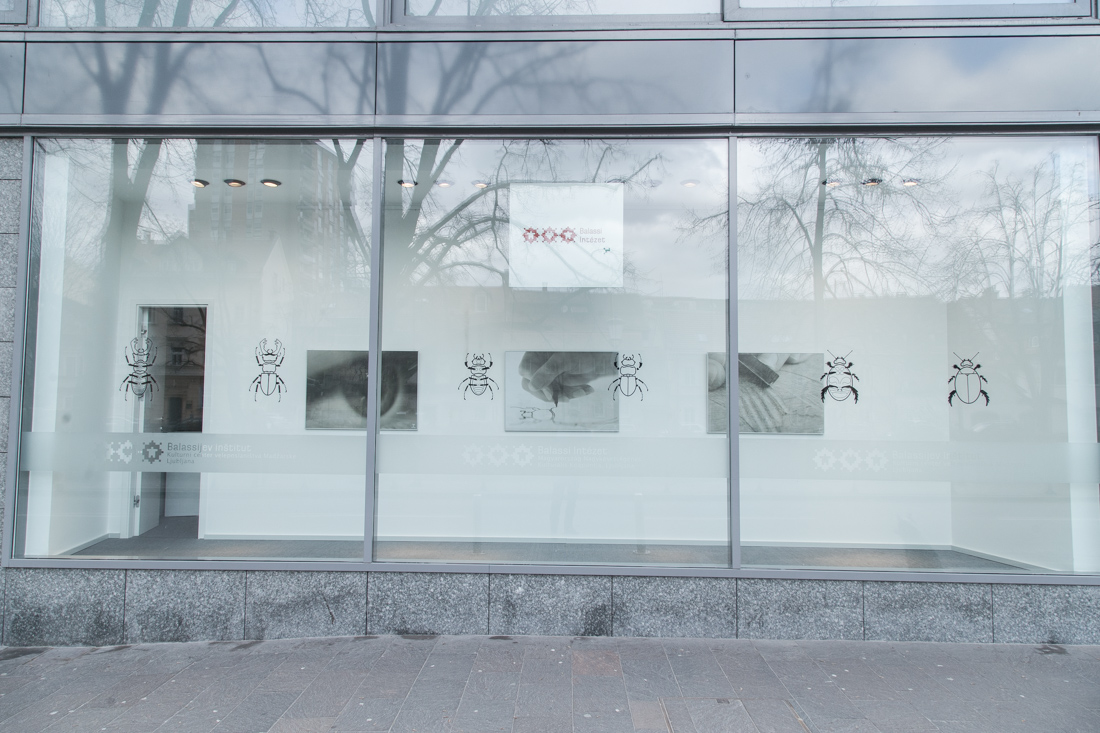
"asset": { "media":"//www.culture.si/images/7/74/Liszt_Institute_Ljubljana_en_%28logo%29.png", "credit":"File:Liszt Institute Ljubljana en (logo).png", "caption":"Caption text goes here" } } ] "date": [ { "startDate":"2,015", "endDate":"2,015", "headline":"Mediadom Pyrhani",
"text":"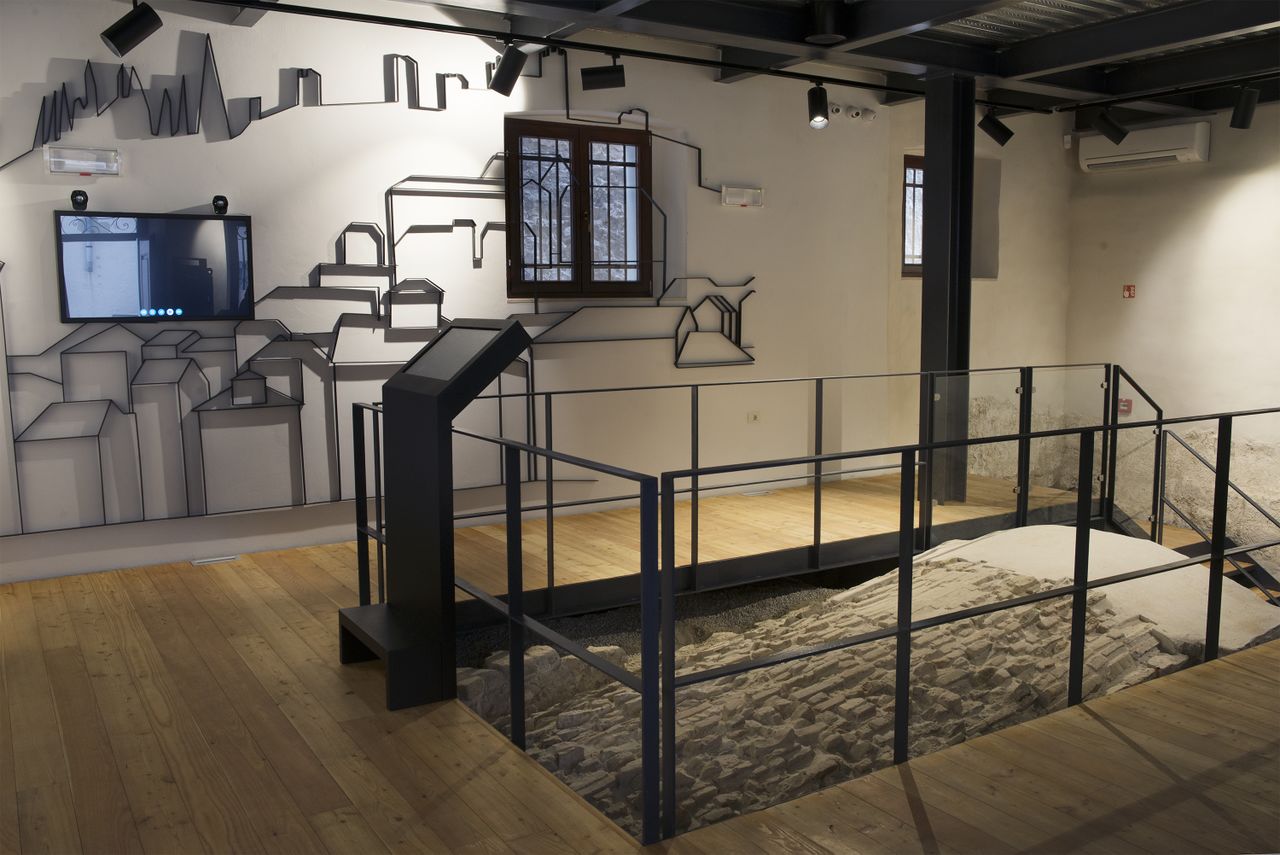 Entrance to the newly discovered underground corridor below Mediadom Pyrhani, 2015
Mediadom Pyrhani is a multimedia museum and a multipurpose venue set in the city centre of the coastal town of Piran. Established in 2015, the place is fully equipped to host all sorts of events, from concerts, film screenings and theatre plays to round tables, lectures and workshops. As a museum, it is focused on Piran and its history presented via a variety of media, from 3-D film projections to interactive, motion sensing displays. Additionally, Mediadom Pyrhani is also meant to serve as a network node for the activities of the coastal cultural producers and institutions.
Managed by the Association of Cultural Societies Piran, Mediadom has hosted festivals such as the Festival of European and Mediterranean Film, the Mediterranean International Folklore Festival (MIFF), the Tartini Festival and several events (workshops, concerts and such), some of them organised by Mediadom itself. It also offers all the information concerning the upcoming events and cultural institutions of Piran.
Entrance to the newly discovered underground corridor below Mediadom Pyrhani, 2015
Mediadom Pyrhani is a multimedia museum and a multipurpose venue set in the city centre of the coastal town of Piran. Established in 2015, the place is fully equipped to host all sorts of events, from concerts, film screenings and theatre plays to round tables, lectures and workshops. As a museum, it is focused on Piran and its history presented via a variety of media, from 3-D film projections to interactive, motion sensing displays. Additionally, Mediadom Pyrhani is also meant to serve as a network node for the activities of the coastal cultural producers and institutions.
Managed by the Association of Cultural Societies Piran, Mediadom has hosted festivals such as the Festival of European and Mediterranean Film, the Mediterranean International Folklore Festival (MIFF), the Tartini Festival and several events (workshops, concerts and such), some of them organised by Mediadom itself. It also offers all the information concerning the upcoming events and cultural institutions of Piran.
"asset": { "media":"//www.culture.si/images/9/9a/Mediadom_Pyrhani_%28logo%29.svg", "credit":"File:Mediadom Pyrhani (logo).svg", "caption":"Caption text goes here" } } ] "date": [ { "startDate":"2,015", "endDate":"2,015", "headline":"Outsider",
"text":"Published since May 2015, Outsider is an internationally-minded quarterly magazine, primarily focused on "spatial" culture. As such, it takes architectural and urban issues as a starting point, but then expands them with a myriad of their cultural, social and personal contexts. Consequently, the magazine deals with design, urban planning, literature, photography, architectural trends and history, illustration, and also just curious personalities from in-between these coordinates.
","asset": { "media":"//www.culture.si/images/b/b1/Outsider_%28logo%29.svg", "credit":"File:Outsider (logo).svg", "caption":"Caption text goes here" } } ] "date": [ { "startDate":"2,015", "endDate":"2,015", "headline":"Celje FOKUS Festival",
"text":"Celje FOKUS Festival – a festival of authorial photography – was first held in 2015 and is currently one of the few or even the only one of its kind in Slovenia. It has grown out of an annual workshop called Celje FOKUS, held in Celje since 2008. Aimed mostly at amateur photographers, the 6-day workshops have given them not only a set of technical know-how but also introduced them to some of the relevant questions arising from the subject of contemporary photography. For this, outside guests have sometimes also been invited.
","asset": { "media":"//www.culture.si/images/b/bf/Celje_FOKUS_Festival_%28logo%29.svg", "credit":"File:Celje FOKUS Festival (logo).svg", "caption":"Caption text goes here" } } ] "date": [ { "startDate":"2,015", "endDate":"2,015", "headline":"Human1st",
"text":"The Human1st design studio was founded by Boris Balant and Andreja Jež in 2015. The studio excels in brand strategy and development, packaging concepts and development, and corporate identity design.
","asset": { "media":"", "credit":"", "caption":"Caption text goes here" } } ] "date": [ { "startDate":"2,015", "endDate":"2,015", "headline":"MENT Ljubljana",
"text":"Established in 2015, MENT Ljubljana is an international music showcase festival taking place at various Ljubljana venues beginning of February. It is comprised of a series of music acts (fresh artists joined by established head-liners), a conference programme dealing with the intricacies of music businesses, and additional events such as exhibitions or workshops on new art and media technologies. Moreover, MENT is a year-long project intended to help Slovene musicians and music professionals with promotion and networking. To this end, MENT enlists and accompanies them to other showcase festivals.
","asset": { "media":"//www.culture.si/images/5/5c/MENT_Ljubljana_%28logo%29.svg", "credit":"File:MENT Ljubljana (logo).svg", "caption":"Caption text goes here" } } ] "date": [ { "startDate":"2,015", "endDate":"2,015", "headline":"Urbano Dejanje",
"text":"Urbano Dejanje or UD Festival was launched in Ljubljana in 2015. Styling itself as a distinctively urban happening (its name could be translated as "urban act"), this diverse event not only features music performances and art exhibitions but also various side-affairs such as breakdance sessions and even a skate fair. It (usually) takes place at the courtyard of the Tobačna Cultural Quarter, but took over Congress Square in 2017.
The festival is organised by Lightbox, an event management team also well-known for staging renowned names from the international clubbing scene. The first three editions were co-produced by ZOO, a club formerly situated in the Tobačna complex, running a lively programme ranging from dance music to jazz and folk concerts (the place won TripAdvisor's best live venue in Ljubljana award for 2015). Because the ZOO Club closed in 2017, the 2018 edition of the Urbano Dejanje took place at the Tobačna Street, the Čin čin bar and the K4 Club.
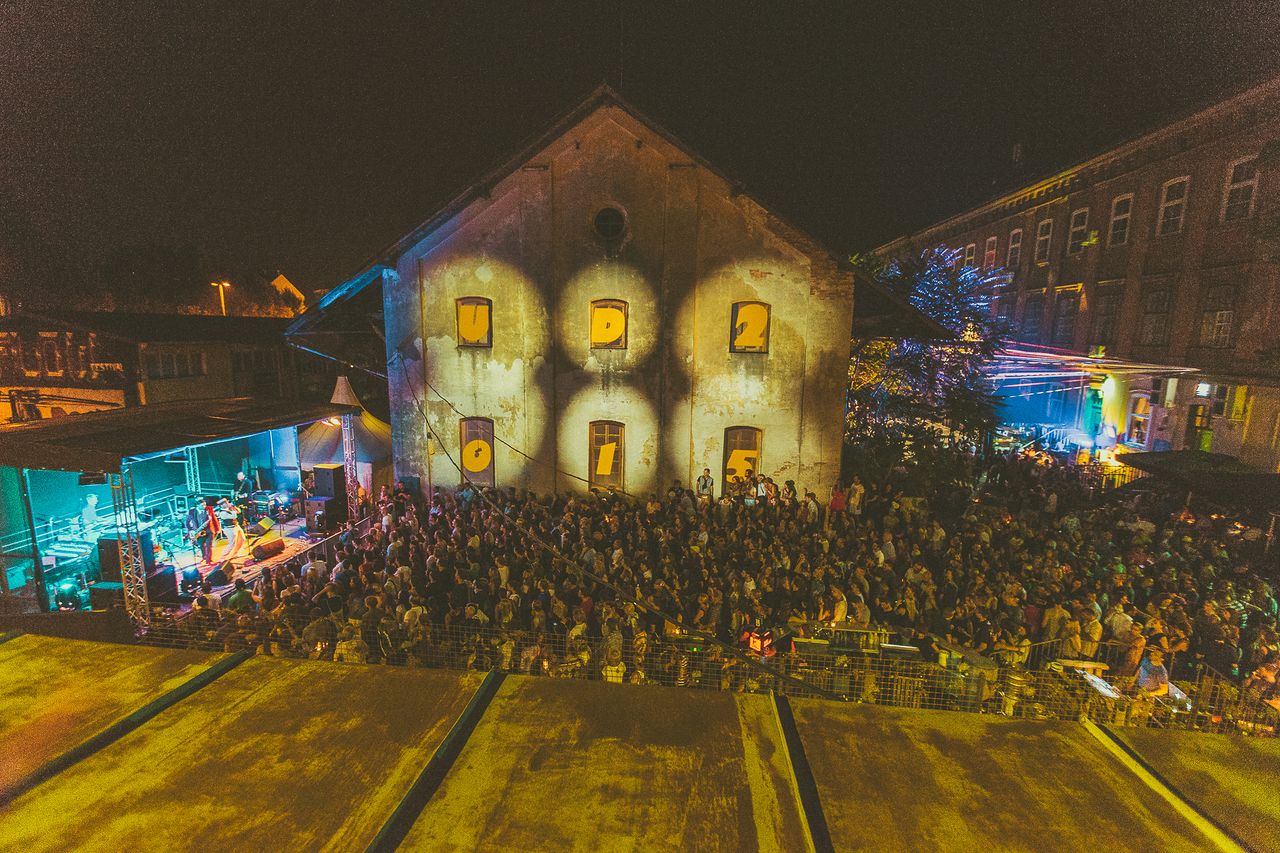 The courtyard of the Tobačna Cultural Quarter, as seen during Urbano Dejanje, 2015
The courtyard of the Tobačna Cultural Quarter, as seen during Urbano Dejanje, 2015
"asset": { "media":"//www.culture.si/images/f/f4/Urbano_Dejanje_%28logo%29.svg", "credit":"File:Urbano Dejanje (logo).svg", "caption":"Caption text goes here" } } ] "date": [ { "startDate":"2,015", "endDate":"2,015", "headline":"Consulate of the Republic of Slovenia in New York",
"text":"In November 2012 the Consulate General of the Republic of Slovenia in New York was closed, the tasks of the Consulate General were assumed by the Embassy of the Republic of Slovenia Washington. In 2015 the government opened the Consulate of the Republic of Slovenia in New York.
","asset": { "media":"", "credit":"", "caption":"Caption text goes here" } } ] "date": [ { "startDate":"2,015", "endDate":"2,015", "headline":"FeKK Ljubljana Short Film Festival",
"text":"The FeKK Ljubljana Short Film Festival first kicked off in 2015. Both an internationally and locally oriented festival, it aims to forefront the somewhat neglected culture of short films, be them animated, experimental or of any other type. The week-long festival includes various, competitive and non-competitive sections, international meetings and guests, round tables and also just plain all-night parties. As such it works on developing the local short film scene and connecting its producers, authors, theorists and organisers.
","asset": { "media":"//www.culture.si/images/8/8c/FeKK_Ljubljana_Short_Film_Festival_%28logo%29.svg", "credit":"File:FeKK Ljubljana Short Film Festival (logo).svg", "caption":"Caption text goes here" } } ] "date": [ { "startDate":"2,015", "endDate":"2,015", "headline":"The Last Contemporary Art Museum",
"text":"The Last Contemporary Art Museum is a highly peculiar art exhibition venue, set deep in the hills, in a small village called Logje. It was set up by the sculptor and multimedia artist Damijan Kracina, who rearranged his 200-year-old house according to the concept of the "cabinets of curiosities" (Wunderkammer), the Renaissance precursors to museums. This is not a coincidence, but rather a clear-cut serendipity: the main focus of the museum, Kracina's sculptures, graphic art and videos, frequently tackle the biotic diversity of the animal world. This off the beaten track setting is a perfect site for the afterlife of such objects. While an exhibition goer gets immersed into the theatre of memory, recollecting past encounters with individual sculptures at various exhibitions, a tourist is taken by surprise as he stumbles upon a world of contemporary art far from the white-cube gallery spaces.
","asset": { "media":"//www.culture.si/images/1/16/The_Last_Contemporary_Art_Museum_%28logo%29.svg", "credit":"File:The Last Contemporary Art Museum (logo).svg", "caption":"Caption text goes here" } } ] "date": [ { "startDate":"2,015", "endDate":"2,015", "headline":"October Jazz",
"text":"Holding a rather suggestive name, October Jazz is an autumn festival presenting contemporary jazz music. Taking place in the city of Nova Gorica and its surrounding region, the event has been organised by the Nova Gorica Arts Centre since 2015. Distinctly international, it is co-produced with the Italian association Controtempo Cormons, otherwise responsible for the Festival of Jazz & Wine of Peace in Cormons.
The bulk of the festival programme is held at the Nova Gorica Arts Centre. Other venues include the Cultural Centre Gorizia (IT), also a co-producer, and sporadic locations such as the Castle Rubije and a manor called Villa Vipolže.
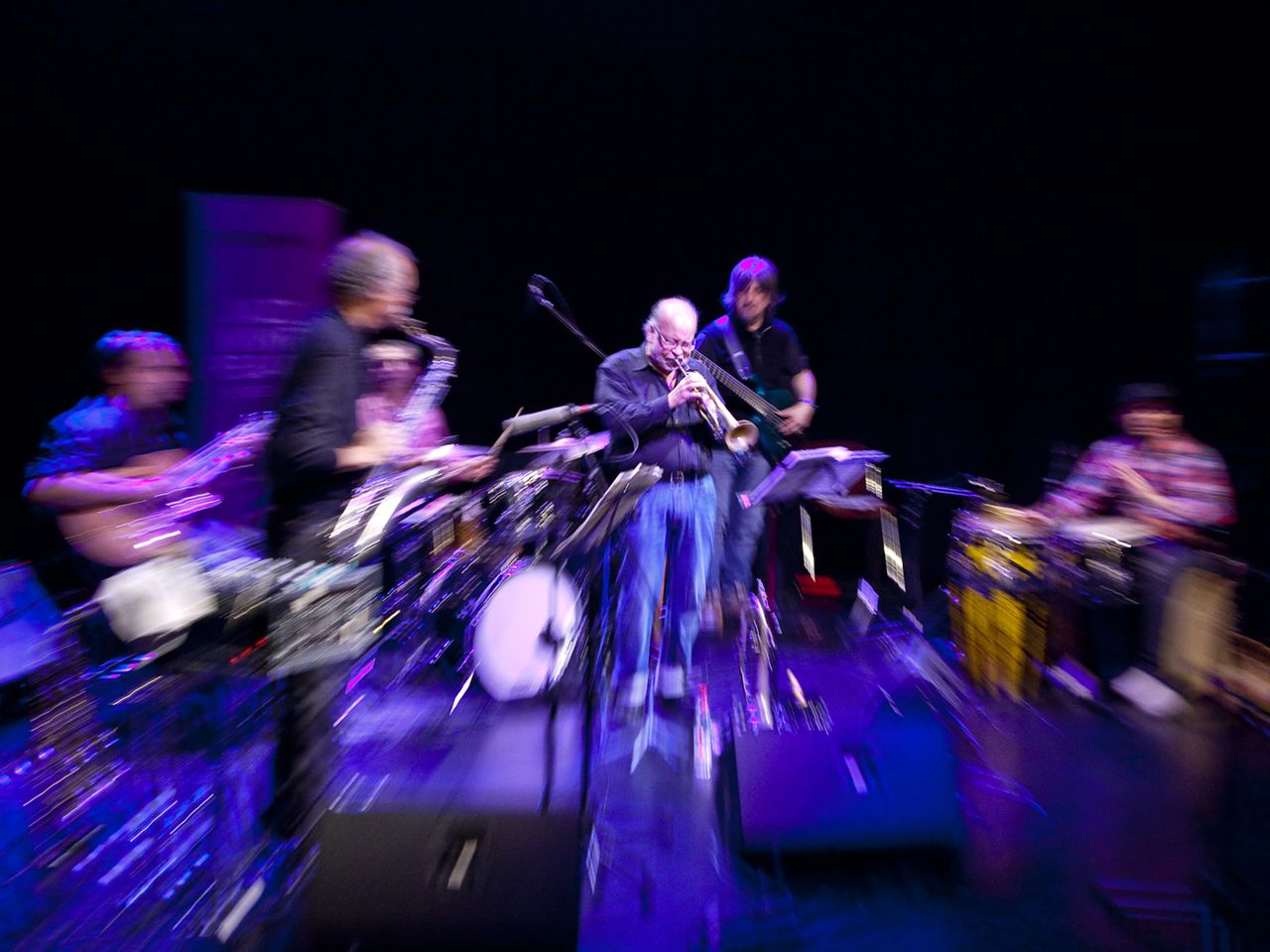 Karlheinz 'Carlitos' Miklin & Quinteto Argentina (At, AR) performing at October jazz, a small jazz festival held in the town of Nova Gorica, 2014
Karlheinz 'Carlitos' Miklin & Quinteto Argentina (At, AR) performing at October jazz, a small jazz festival held in the town of Nova Gorica, 2014
"asset": { "media":"", "credit":"", "caption":"Caption text goes here" } } ] "date": [ { "startDate":"2,015", "endDate":"2,015", "headline":"Museum of Puppetry",
"text":"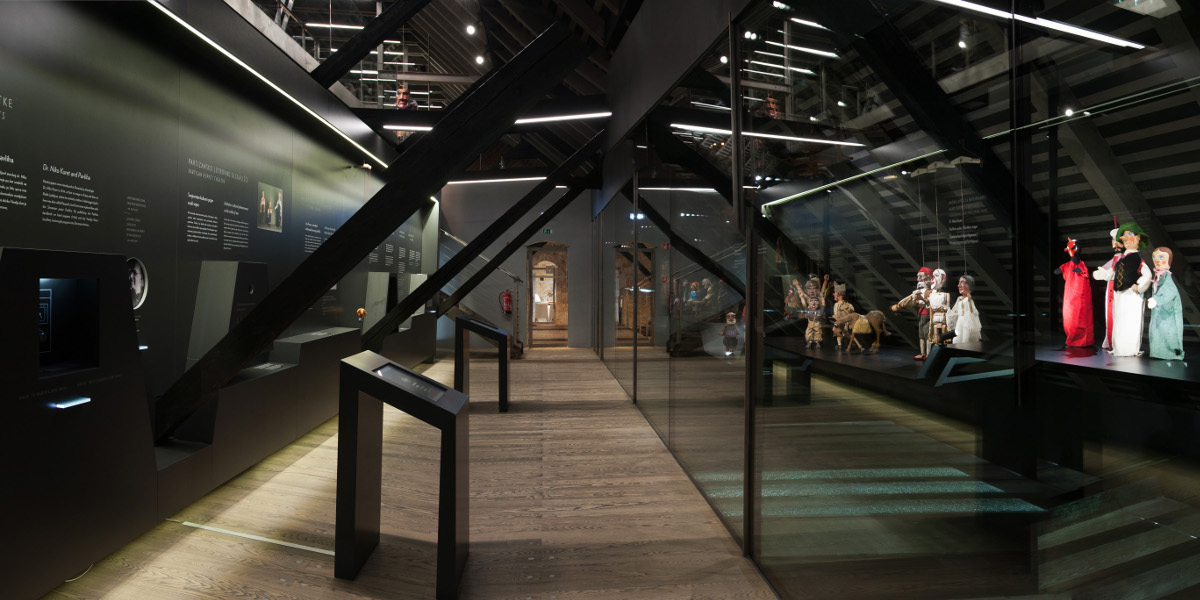 Museum of Puppetry at Ljubljana Castle, 2015
Opened in 2015, the Museum of Puppetry is a joint project of the Ljubljana Puppet Theatre and the Ljubljanski grad Public Institute, supported by the Municipality of Ljubljana. The permanent exhibition Images of Slovenian Puppetry Art, 1910-1990 displays the numerous forms, contexts and techniques of puppet shows, featuring both children's plays as well as experimental theatre performances.
The establishment of the museum presents a pioneering work for Slovenian puppet arts, as the material history of Slovenian puppetry has never before been systematically researched, not to mention restored and exhibited. With this in mind, one of the primary objectives of the museum is to create the conditions for the proper care and long-term preservation of Slovenian puppetry culture heritage.
Museum of Puppetry at Ljubljana Castle, 2015
Opened in 2015, the Museum of Puppetry is a joint project of the Ljubljana Puppet Theatre and the Ljubljanski grad Public Institute, supported by the Municipality of Ljubljana. The permanent exhibition Images of Slovenian Puppetry Art, 1910-1990 displays the numerous forms, contexts and techniques of puppet shows, featuring both children's plays as well as experimental theatre performances.
The establishment of the museum presents a pioneering work for Slovenian puppet arts, as the material history of Slovenian puppetry has never before been systematically researched, not to mention restored and exhibited. With this in mind, one of the primary objectives of the museum is to create the conditions for the proper care and long-term preservation of Slovenian puppetry culture heritage.
"asset": { "media":"//www.culture.si/images/2/20/Museum_of_Puppetry_%28logo%29.svg", "credit":"File:Museum of Puppetry (logo).svg", "caption":"Caption text goes here" } } ] "date": [ { "startDate":"2,015", "endDate":"2,015", "headline":"Iridium Film",
"text":"Iridium Film is a film production and post-production company founded in 2015 by Bojan Mastilović and Janez Ferlan. It is based in the historic town of Škofja Loka, approximately 24 km northwest of Ljubljana. Its main focus is on international co-production, particularly of feature films, although it also provides post-production and film restoration services, and has acted as sole producer on several projects. It is the successor to the RestArt production company.
","asset": { "media":"", "credit":"", "caption":"Caption text goes here" } } ] "date": [ { "startDate":"2,015", "endDate":"2,015", "headline":"PIFcamp",
"text":"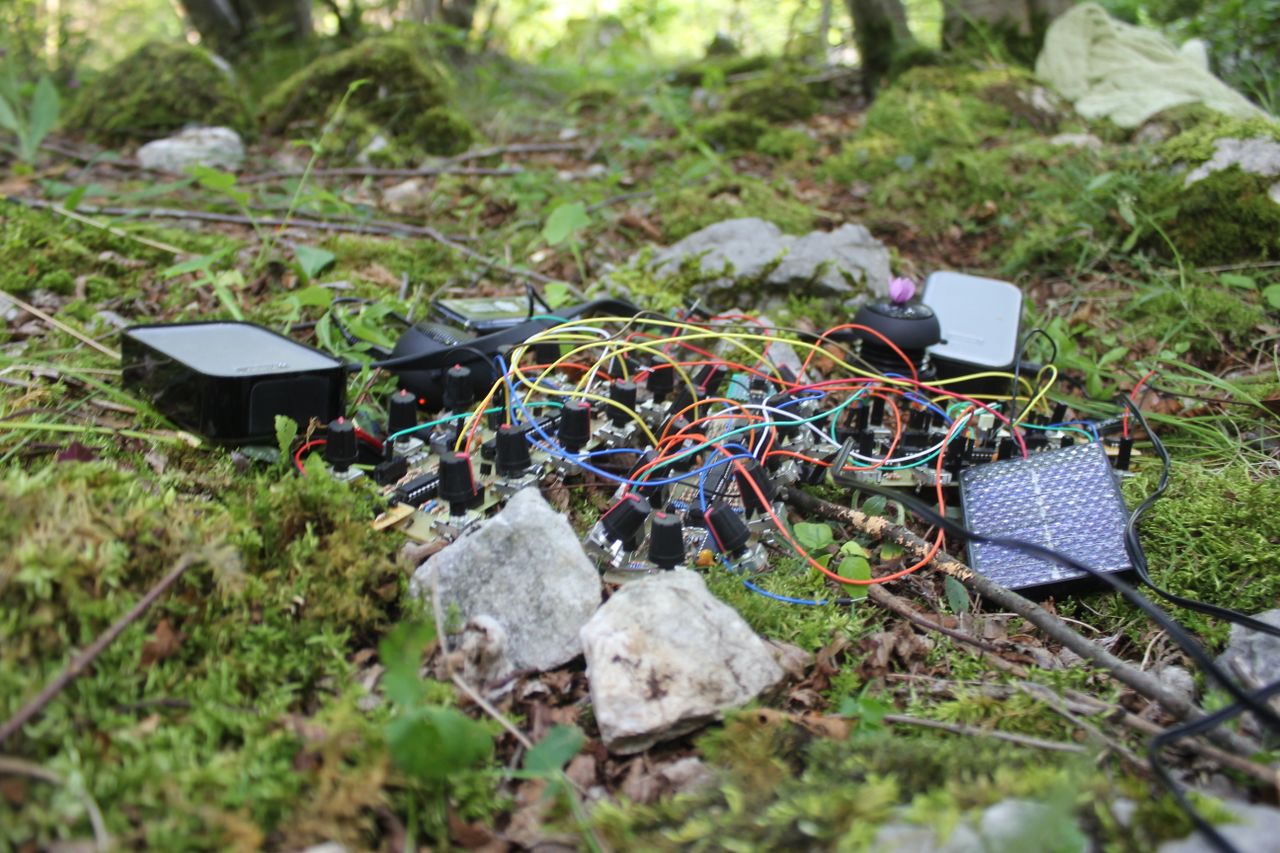
"asset": { "media":"//www.culture.si/images/f/fe/PIFcamp_%28logo%29.svg", "credit":"File:PIFcamp (logo).svg", "caption":"Caption text goes here" } } ] "date": [ { "startDate":"2,015", "endDate":"2,015", "headline":"Minorite Church, Maribor",
"text":"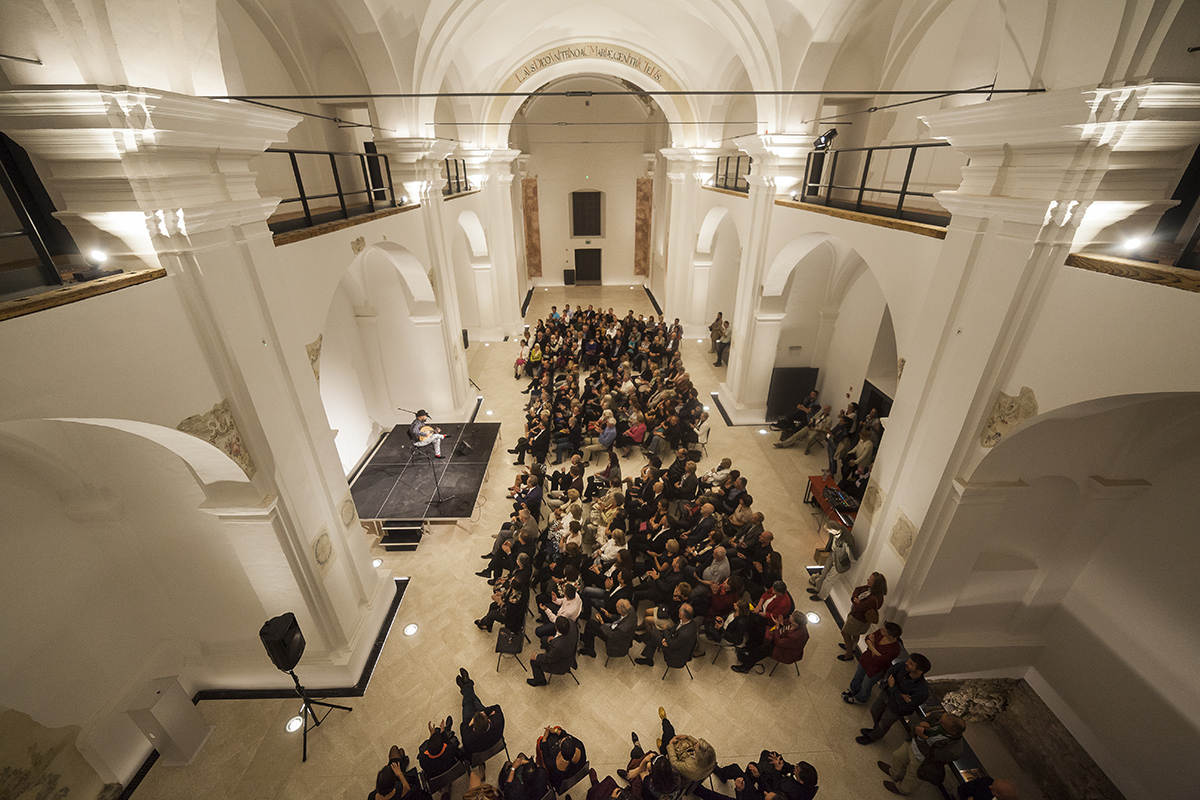 Joseph Tawadros solo oud performance in the Minorite Church at the Festival Maribor, 2015
The Minorite Church, Maribor is a recently established performing arts venue that opened its doors in 2015. Set on the banks of the Drava River in Maribor, in the city's medieval quarter called Lent, the former church was given a thorough renovation between the years 2013 and 2015. Since then it is used for a variety of cultural events, from classical music and contemporary choir concerts to puppet theatre plays, dance performances, lectures and various exhibitions.
The venue is managed by the Maribor Puppet Theatre, which is since 2010 located in the adjacent former Minorite Convent (also recently reconstructed). Allowing for an audience of approximately 300, the refurbishment of the church as well as the convent has been designed by ATELIERarhitekti.
Joseph Tawadros solo oud performance in the Minorite Church at the Festival Maribor, 2015
The Minorite Church, Maribor is a recently established performing arts venue that opened its doors in 2015. Set on the banks of the Drava River in Maribor, in the city's medieval quarter called Lent, the former church was given a thorough renovation between the years 2013 and 2015. Since then it is used for a variety of cultural events, from classical music and contemporary choir concerts to puppet theatre plays, dance performances, lectures and various exhibitions.
The venue is managed by the Maribor Puppet Theatre, which is since 2010 located in the adjacent former Minorite Convent (also recently reconstructed). Allowing for an audience of approximately 300, the refurbishment of the church as well as the convent has been designed by ATELIERarhitekti.
"asset": { "media":"", "credit":"File:Minoritska cerkev (logo).svg", "caption":"Caption text goes here" } } ] "date": [ { "startDate":"2,015", "endDate":"2,015", "headline":"Fran.si",
"text":"The Fran.si aggregates the 8 dictionaries of the Fran Ramovš Institute of the Slovenian Language. It is available since 2015.
","asset": { "media":"", "credit":"File:Fran, Slovarji Inštituta za slovenski jezik Frana Ramovša ZRC SAZU (logo).svg", "caption":"Caption text goes here" } } ] "date": [ { "startDate":"2,015", "endDate":"2,015", "headline":"Grounded Festival",
"text":"Launched in 2015, Grounded, a festival of electronic music, critical thinking and activism, addresses current social issues by combining seemingly incompatible: deinstitutionalised theoretical debates, every day social activism and progressive electronic club culture. Through debates, projections, presentations, music performances and hangouts, the participants seek relevant, eligible and responsible answers to the contemporary challenges. The Grounded Festival is hosted by Pritličje Cafe in Ljubljana.
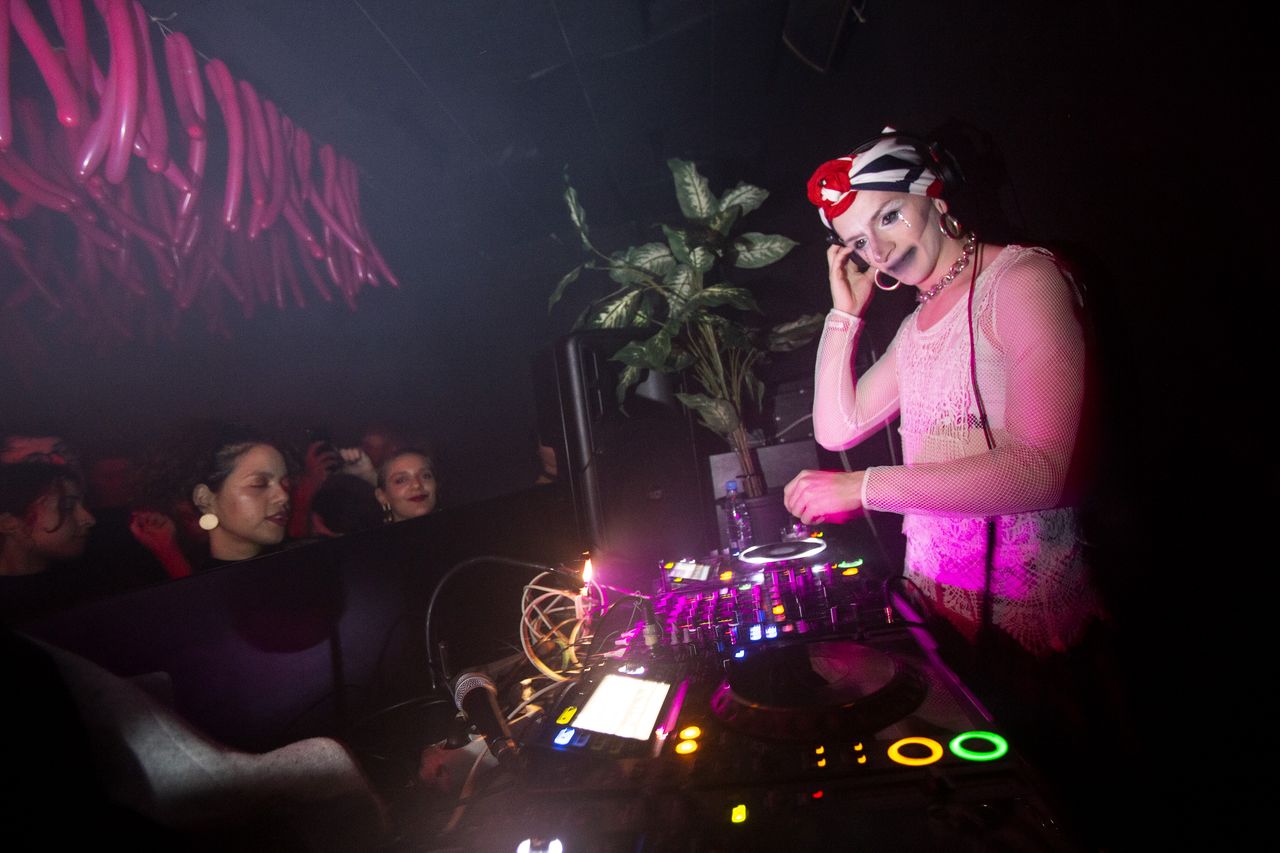 LOFT performing at Klub Monokel, Grounded Festival, 2018.
LOFT performing at Klub Monokel, Grounded Festival, 2018.
"asset": { "media":"", "credit":"", "caption":"Caption text goes here" } } ] "date": [ { "startDate":"2,015", "endDate":"2,015", "headline":"Slovene Writers' Association Residency Programme",
"text":"The Slovene Writers’ Association first set up a residency programme in 2015 in the Ljubljana neighbourhood of Šiška. Later on, the association moved the programme to the Dane Zajc Writers' Studio on Praprotnikova ulica in the neighbourhood of Prule. Each year, the residency programme hosts up to 12 authors from abroad to work 4 weeks in the studio apartment. Eligible residents are writers or translators (into Slovenian) with at least 2 published works. The selected residents have their living expenses covered.
","asset": { "media":"", "credit":"File:Rezidenčni program Društva slovenskih pisateljev (logo).svg", "caption":"Caption text goes here" } } ] "date": [ { "startDate":"2,015", "endDate":"2,015", "headline":"House of Tolerance Festival",
"text":"The House of Tolerance Festival, organised since 2015 by Mini Theatre and the Jewish Cultural Centre Ljubljana, is an annual cultural event that emphasises the urgency of carefully considered ethical social engagement. It stands as an important public platform, which reminds the public of the horrors of the Holocaust. The Holocaust, as the laying foundation of the programme, serves as an ultimate warning about times and societies which lacked tolerance as an imperative of human intelligence and development. With the festival's programme of film screenings, concerts, art exhibitions, lectures, round tables and educational activities for the young, the festival organisers try to constantly warn society to thrive towards positive social change.
","asset": { "media":"//www.culture.si/images/c/ce/House_of_Tolerance_Festival_%28logo%29.jpg", "credit":"File:House of Tolerance Festival (logo).jpg", "caption":"Caption text goes here" } } ] "date": [ { "startDate":"2,015", "endDate":"2,015", "headline":"Tricircle Studio",
"text":"Tricircle Studio was established in 2015 by animator and producer Matic Perčič, a graduate of the Institute and Academy for Multimedia (IAM) in Ljubljana. Essentially a one-man outfit, Tricircle provides technical animation services (modelling, compositing, rigging, audio and video editing, post-production etc.) for feature films and other producers' animations, as well as for commercial clients.
","asset": { "media":"", "credit":"", "caption":"Caption text goes here" } } ] "date": [ { "startDate":"2,015", "endDate":"2,015", "headline":"Kino Bežigrad",
"text":"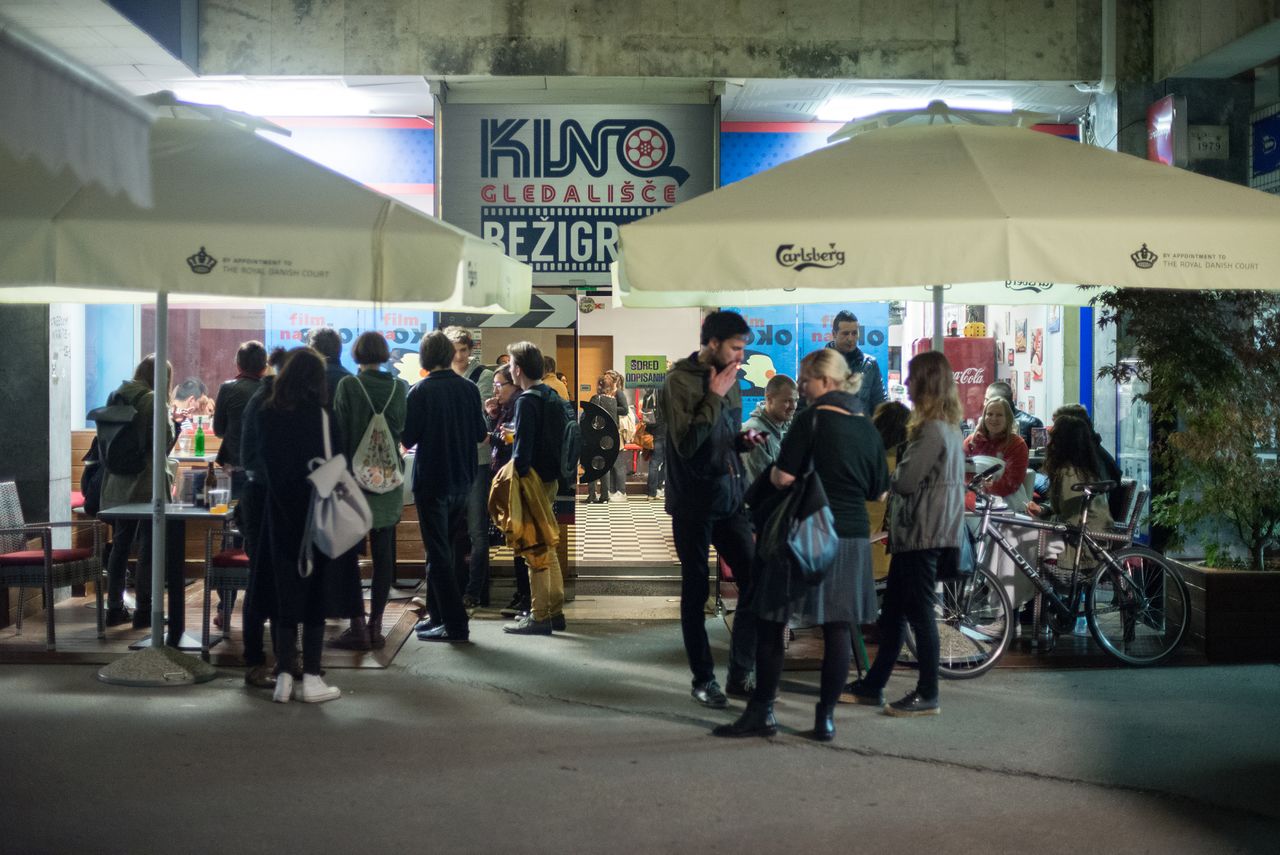 Outside Kino Bežigrad, Eye on Film Festival, 2016.
Kino Bežigrad – sometimes also called Kino Gledališče Bežigrad (Cinema Theatre Bežigrad) – is a small cinema in the Ljubljana neighbourhood of Bežigrad. It opened its doors in 2015 at the premises where a cinema of the same name formerly operated until 2002. Kino Bežigrad runs an independent programme of films, mostly of the Hollywood variety, but is open for occasional ventures into other cinematographies as well.
The cinema has one auditorium with 247 seats in 14 rows and a 10 m x 5 m big screen. It is complemented by a bar styled in the look of typical American 1950s diners and regularly used for various events.
Outside Kino Bežigrad, Eye on Film Festival, 2016.
Kino Bežigrad – sometimes also called Kino Gledališče Bežigrad (Cinema Theatre Bežigrad) – is a small cinema in the Ljubljana neighbourhood of Bežigrad. It opened its doors in 2015 at the premises where a cinema of the same name formerly operated until 2002. Kino Bežigrad runs an independent programme of films, mostly of the Hollywood variety, but is open for occasional ventures into other cinematographies as well.
The cinema has one auditorium with 247 seats in 14 rows and a 10 m x 5 m big screen. It is complemented by a bar styled in the look of typical American 1950s diners and regularly used for various events.
"asset": { "media":"", "credit":"File:Kino Gledališče Bežigrad (logo).svg", "caption":"Caption text goes here" } } ] "date": [ { "startDate":"2,015", "endDate":"2,015", "headline":"Bližjiknjigi.si",
"text":"Bližjiknjigi.si is a central information portal for all things concerning Slovenian literature. Established in 2015 by the Slovenian Book Agency, the portal holds a vast database of authors, publishers, editors, libraries, printers and other protagonists involved in the production of literary arts. All of these are cross-linked, connected to the Slovene Virtual Library COBISS, indexed with metadata and (more or less) furnished with contact information.
","asset": { "media":"", "credit":"", "caption":"Caption text goes here" } } ] "date": [ { "startDate":"2,015", "endDate":"2,015", "headline":"Ana's Festival Rogaška Slatina",
"text":"Ana's Festival Rogaška Slatina, organised by the Rogaška Slatina Public Institute for Tourism and Culture and held for the first time in 2015, is an annual outdoor summer festival. It takes place at three locations in the spa town of Rogaška Slatina in eastern Slovenia: the European Platform (Evropska ploščad), the Tempel Pavilion and the arcades of the Grand Hotel Rogaška. It is financed by the Municipality of Rogaška Slatina, with sponsorship and other support provided by a variety of organisations associated with the town's health tourism industry (Donat Mg mineral water, Rogaška Resort and the Rogaška Hotel Group) and by Rogaška Crystalworks, the internationally famed glassware manufacturer. Entry to all events is free. Aimed mainly at holiday-makers and the local population, Ana's Festival features Slovenian (and to a lesser extent) international musical artists from the worlds of pop, blues, jazz, folk and classical music. Rogaška Slatina Cultural Centre is also used to host events in the event of bad weather. Owing to the Covid-19 pandemic, the festival did not take place in 2020.
","asset": { "media":"", "credit":"", "caption":"Caption text goes here" } } ] "date": [ { "startDate":"2,015", "endDate":"2,015", "headline":"Šubic House",
"text":"Šubic House is a culture and art centre located in Poljane near Škofja Loka, one of the oldest Slovene towns, in Poljanska Valley. It is a birthplace of Janez Šubic and his younger brother Jurij Šubic, two of the most important Slovene painters. It is also a place where the most renowned artisan workshop of the 19th century was operated by their father Štefan Šubic. A renovated house was opened as a Cultural Centre of the Šubic Painters in 2015. Today it houses a permanent art collection and hosts a diverse programme of exhibitions, workshops and other cultural events.
","asset": { "media":"", "credit":"File:Šubičeva hiša (logo).svg", "caption":"Caption text goes here" } } ] "date": [ { "startDate":"2,015", "endDate":"2,015", "headline":"Klub Baza Ajdovščina",
"text":"Klub Baza is an independent club in the town of Ajdovščina. Established in 2015, it is stationed at the former premises of the Student Club Ajdovščina, near the city centre. Launched by a self-initiative Klub Baza is run by a diverse collective of locals who craved for a venue in which various cultural activities (sometimes of a more alternative character) could take place. Here, one can attend music concerts of all varieties (jazz, rock, metal, techno, etc.), see a photography or fine arts exhibition, listen to a travelogue lecture or even set up one's own gig or exhibition. Klub Baza Ajdovščina is also one of the stops for the Club Marathon.
","asset": { "media":"", "credit":"", "caption":"Caption text goes here" } } ] "date": [ { "startDate":"2,014", "endDate":"2,014", "headline":"Godibodi Institute",
"text":"Godibodi Institute is a non-for-profit cultural institution, established in 2014. It is a partner institution to Celinka Agency and now takes care for some of its projects, namely the Godibodi Festival, the Sounds of Slovenia ethnographic and concert project and – together with the One Music Society – also the Iz tišine se rodi glasba [From silence grows the music] initiative, which questions the issue of sound pollution.
","asset": { "media":"//www.culture.si/images/b/bc/Godibodi_Institute_%28logo%29.svg", "credit":"File:Godibodi Institute (logo).svg", "caption":"Caption text goes here" } } ] "date": [ { "startDate":"2,014", "endDate":"2,014", "headline":"Kraken Film Society",
"text":"Formed in 2014 by a group of young film enthusiasts and professionals, the Kraken Film Society is the vehicle under which its members work on promoting and establishing short films as an unique cinematic art form. The society engages in a variety of activities, from collaborating on film programmes at venues and festivals across Slovenia, to promoting Slovenian authors abroad and disseminating information about various submission calls and the like. The group's long-term aim is "to become a national platform for educating audiences on the specifics and the idiosyncrasies of the short film form, as well as uniting film authors, theoreticians, producers and distributors".
","asset": { "media":"", "credit":"", "caption":"Caption text goes here" } } ] "date": [ { "startDate":"2,014", "endDate":"2,014", "headline":"Jardier",
"text":"The five-piece band Jardier is creating a contemporary amalgam of pop, rock, folk, and blues, knit together with a strikingly polished production. The group was built around its frontman Alex Raztresen in 2014, when he gradually gathered an experienced crew of musicians from renowned bands such as Srečna mladina and Moveknowledgement. Jardier have since fast gained widespread recognition and also some relatively high-profile gigs.
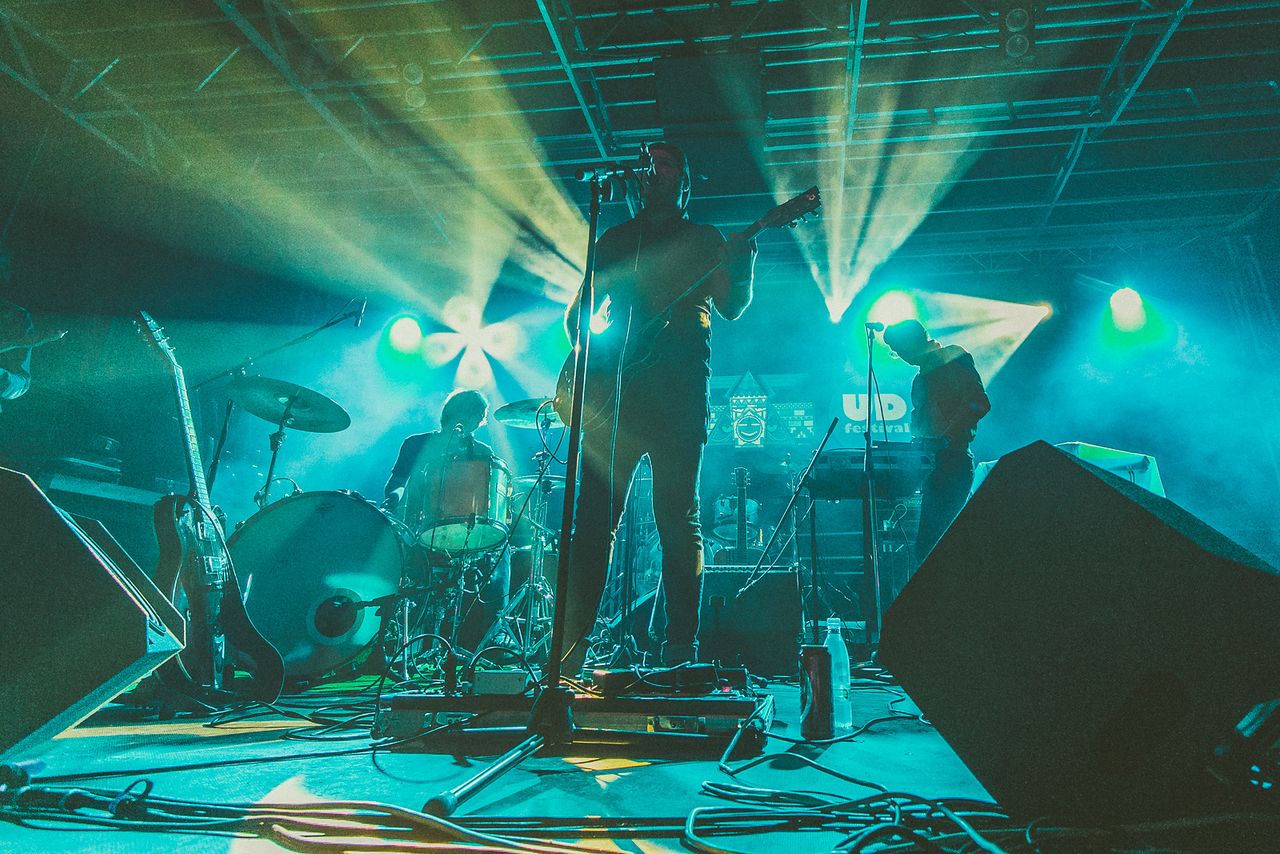 The indie-pop-rock act Jardier, playing at UD Festival, 2016
The indie-pop-rock act Jardier, playing at UD Festival, 2016
"asset": { "media":"", "credit":"File:Jardier (logo).svg", "caption":"Caption text goes here" } } ] "date": [ { "startDate":"2,014", "endDate":"2,014", "headline":"American Slovenian Education Foundation",
"text":"The American Slovenian Education Foundation (ASEF) was established in 2014 with the objective of enhancing American and Slovenian education activities and uniting Slovenian scholars and educators globally. The ASEF offers grant and endowment programmes, provides teaching and learning materials, and facilitate students and faculty exchange. The American Slovenian Education Foundation is based in Stanford, California, but aims to have branches in other states and countries as well.
","asset": { "media":"", "credit":"File:American Slovenian Education Foundation (ASEF) (logo).svg", "caption":"Caption text goes here" } } ] "date": [ { "startDate":"2,014", "endDate":"2,014", "headline":"Creative Europe Desk Slovenia",
"text":"The Creative Europe Desk Slovenia (CED Slovenia) is run by the Motovila Institute. It was established in January 2014 as a national information office for promotion of the EU Creative Europe programme (2014–2020) that supports cultural and audiovisual sectors. It performs the tasks of the former CCP Slovenia and Media Desk Slovenia.
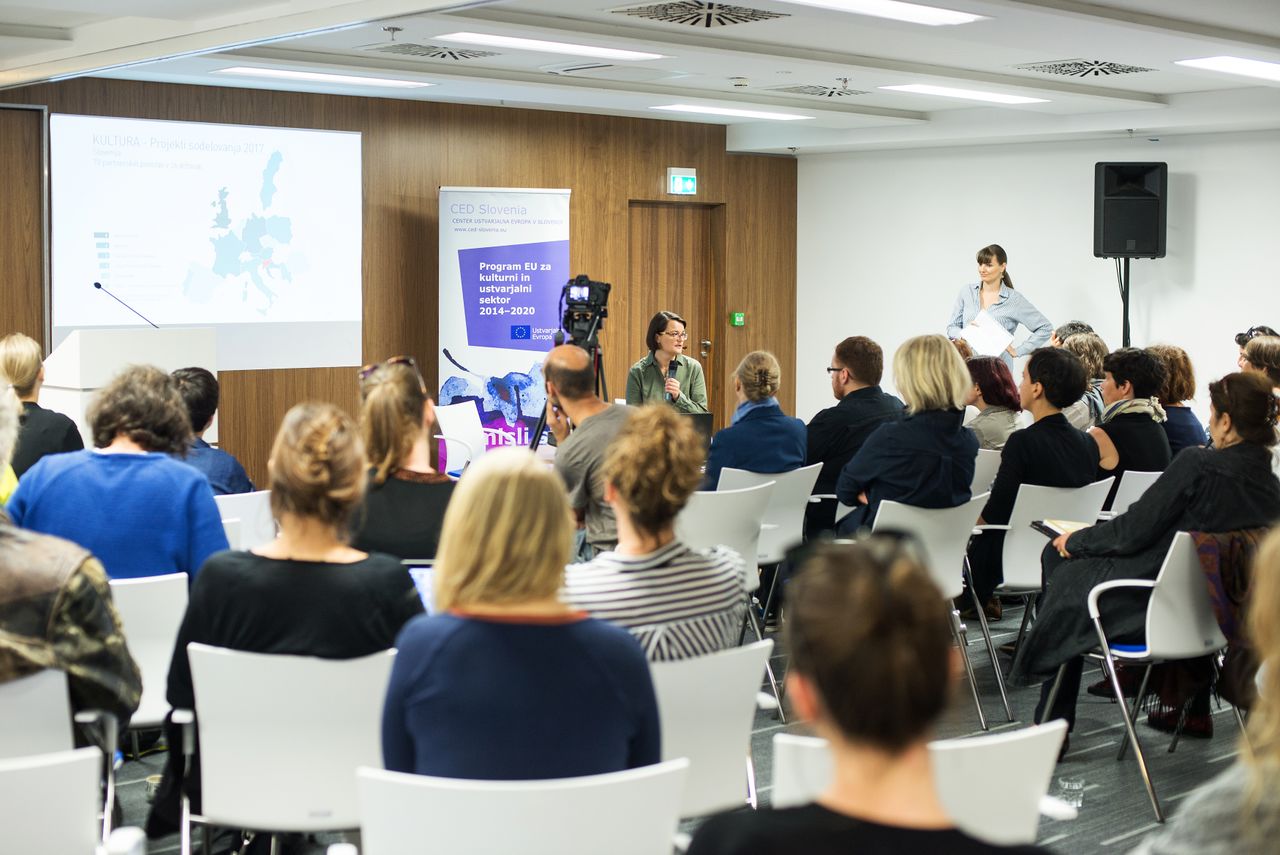 Creative Europe Desk Slovenia event at European Union House, 2017.
Creative Europe Desk Slovenia event at European Union House, 2017.
"asset": { "media":"//www.culture.si/images/8/8f/Creative_Europe_Desk_Slovenia_%28logo%29_eng.jpg", "credit":"File:Creative Europe Desk Slovenia (logo) eng.jpg", "caption":"Caption text goes here" } } ] "date": [ { "startDate":"2,014", "endDate":"2,014", "headline":"Beletrina Publishing Institute",
"text":"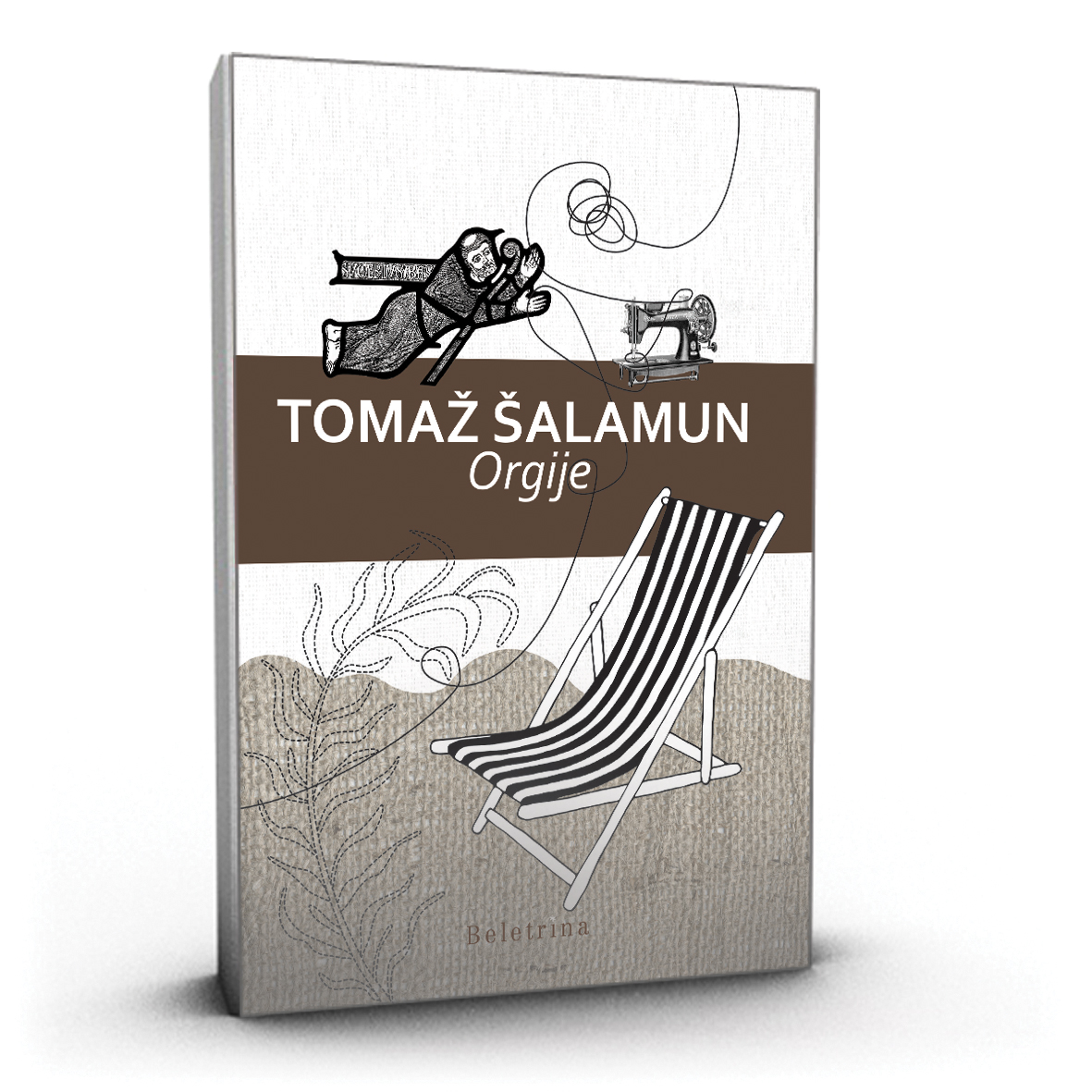 Beletrina Publishing Institute, Tomaž Šalamun - Orgije, 2015
The Beletrina Publishing Institute (up to 2014 known as Študentska založba Publishing House) is one of the most productive Slovene publishing houses. It publishes about 50 titles each year and prides itself on its choice of quality literary works. The main criteria for its work is that the writing is innovative, fresh and radical. The book editions Beletrina or Koda have got acclaimed and popular. The publisher places great importance on international cooperation; each year about 20 books are published abroad.
Beletrina Publishing Institute publishes Časopis za kritiko znanosti.
In November 2009 the Beletrina bookshop was opened in central Ljubljana.
Beletrina publishes also the online magazines AirBeletrina and Versopolis, and produces two festivals: the Days of Poetry and Wine Festival and the World Literatures - Fabula Festival.
Beletrina Publishing Institute, Tomaž Šalamun - Orgije, 2015
The Beletrina Publishing Institute (up to 2014 known as Študentska založba Publishing House) is one of the most productive Slovene publishing houses. It publishes about 50 titles each year and prides itself on its choice of quality literary works. The main criteria for its work is that the writing is innovative, fresh and radical. The book editions Beletrina or Koda have got acclaimed and popular. The publisher places great importance on international cooperation; each year about 20 books are published abroad.
Beletrina Publishing Institute publishes Časopis za kritiko znanosti.
In November 2009 the Beletrina bookshop was opened in central Ljubljana.
Beletrina publishes also the online magazines AirBeletrina and Versopolis, and produces two festivals: the Days of Poetry and Wine Festival and the World Literatures - Fabula Festival.

"asset": { "media":"//www.culture.si/images/2/2c/Beletrina_Publishing_Institute_%28logo%29.svg", "credit":"File:Beletrina Publishing Institute (logo).svg", "caption":"Caption text goes here" } } ] "date": [ { "startDate":"2,014", "endDate":"2,014", "headline":"Slovenian Theatre Institute",
"text":"The Slovenian Theatre Institute (SLOGI) was founded in 2014 as the successor to the National Theatre Museum of Slovenia. The institute is engaged in collecting, preserving, documenting, researching, interpreting, presenting and promoting Slovenian theatre culture, performing arts heritage as well as contemporary theatre practices, both at the national and international level. SLOGI organises exhibitions and presents virtual exhibitions, publishes books from the field of theatre, organises various events (symposia, round tables, lectures, etc.) and educational activities, houses theatre performances, etc. In November 2015, it launched the monthly Slovenian Theatre News. The institute has participated in several international projects. In the period 2019–2023 a new EU supported project was launched: Classics in the Graphic Novel: A pilot model of new high school culture education through graphic novels coordinated by SLOGI, in collaboration with partners from Poland and Slovakia. SLOGI is also a national coordinator for arts and cultural education in the field of theatre, nominated by the Ministry of Culture.
","asset": { "media":"//www.culture.si/images/5/54/Slovenian_Theatre_Institute_%28logo%29.jpg", "credit":"File:Slovenian Theatre Institute (logo).jpg", "caption":"Caption text goes here" } } ] "date": [ { "startDate":"2,014", "endDate":"2,014", "headline":"Stiropor Festival",
"text":"The Stiropor Festival, first held in 2014, is a festival of contemporary club music that takes place at various venues in Ljubljana. Its musical coordinates are very broad, presenting techno, grime, beats, experimental electronica, bass, dub step, synth pop and house live acts and DJ sets, coupled with quirky acts like that of the Syrian turbo folk star Omar Souleyman (who was booked in co-production with Kino Šiška Centre for Urban Culture). The festival is organised by the Stiropor Collective, who set up the whole event as an extension of their previous work, organising concerts and special events throughout the year
","asset": { "media":"", "credit":"", "caption":"Caption text goes here" } } ] "date": [ { "startDate":"2,014", "endDate":"2,014", "headline":"Floating Castle Festival",
"text":"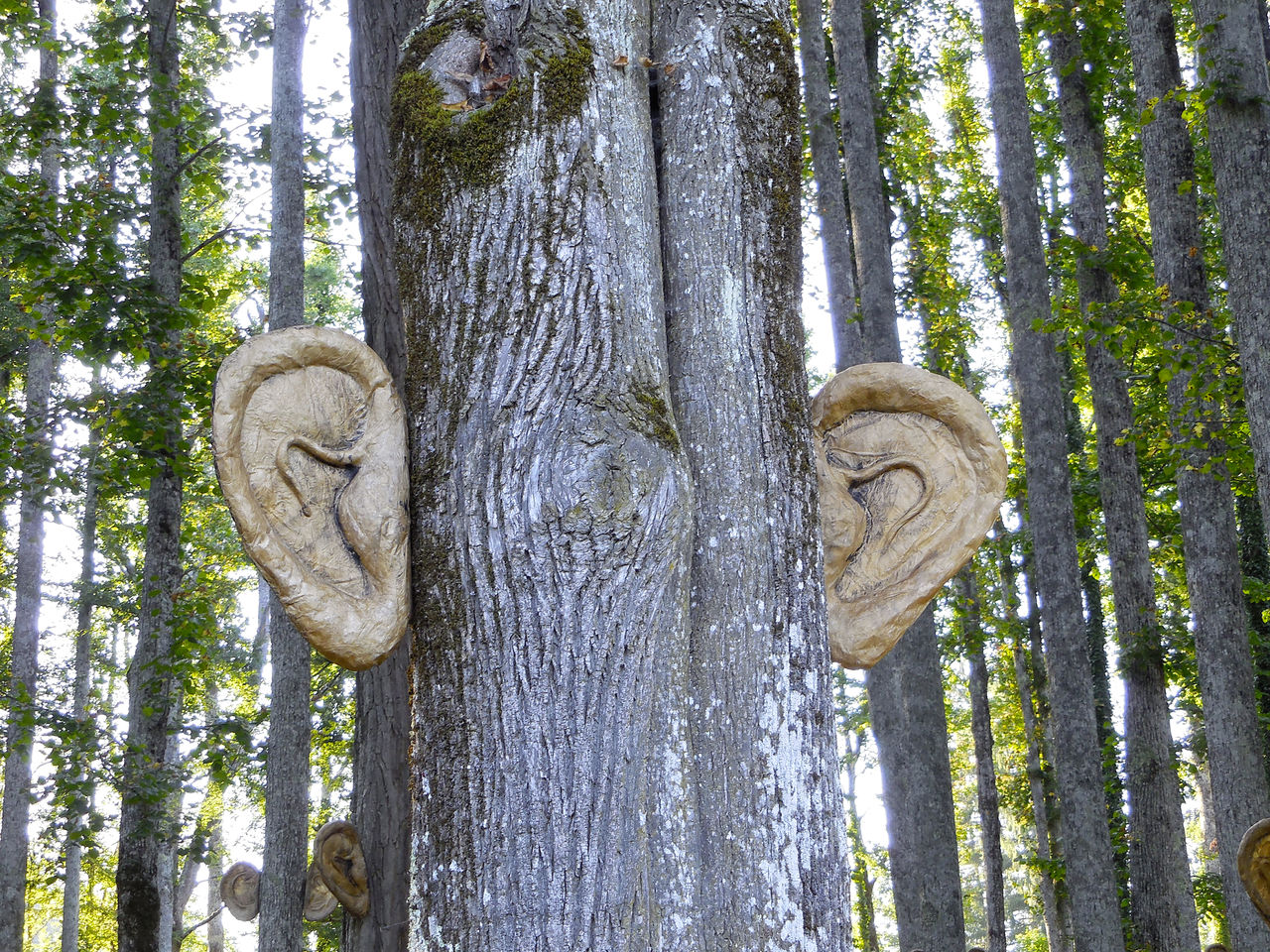 Site-specific installation in the forest at the Floating Castle Festival in the vicinity of Snežnik Castle, 2015
Established in 2014, the Floating Castle Festival takes place in the picturesque surroundings of the Snežnik Castle. It actually started in 2013 as the Burning Castle Festival, derived from the experience of the HISTeRIA Festival (held in Istria). This congenial meeting of artists and various communities is an open-ended project from start to finish, and could best be described as a "folk-puppet-music-theatre site-specific event".
Its charismatic initiator and organiser is Matija Solce, a prolific musician, puppeteer, activist, actor and director who lives in the nearby village of Kozarišče.
Site-specific installation in the forest at the Floating Castle Festival in the vicinity of Snežnik Castle, 2015
Established in 2014, the Floating Castle Festival takes place in the picturesque surroundings of the Snežnik Castle. It actually started in 2013 as the Burning Castle Festival, derived from the experience of the HISTeRIA Festival (held in Istria). This congenial meeting of artists and various communities is an open-ended project from start to finish, and could best be described as a "folk-puppet-music-theatre site-specific event".
Its charismatic initiator and organiser is Matija Solce, a prolific musician, puppeteer, activist, actor and director who lives in the nearby village of Kozarišče.
"asset": { "media":"//www.culture.si/images/1/1d/Floating-logotip.jpeg", "credit":"File:Floating-logotip.jpeg", "caption":"Caption text goes here" } } ] "date": [ { "startDate":"2,014", "endDate":"2,014", "headline":"Film Mixer Independent Film Festival",
"text":"Launched in 2014, the Film Mixer Independent Film Festival presents independent film productions from all over the world. It takes place in Kranj, a regional capital without any art cinema venues and therefore a much needed initiative in the city. The main venues are the courtyard of the Layer House and the neighbouring multimedia centre Škrlovec Tower, which are coupled by a few additional venues throughout the city – the Kranj City Library, the Khislstein Castle and Vovkov vrt, a small park along the old city wall where the Layer House sometimes also sets up occasional film screenings. Conceptually, the festival addresses the rich multitude of contemporary film production that is systematically ignored by the multiplex cinema and TV programme infrastructure, but is nevertheless accessible and relevant. Alongside its main, internationally focused programme, Film Mixer also deals with local and regional film "scenes" and presents the works of various less-established authors. Besides the actual films, there are also round table discussions (for example, on alternative film funding methods and with guest artists), workshops on various related skills, select music video presentations, music concerts, etc.
","asset": { "media":"//www.culture.si/images/1/17/Film_Mixer_Independent_Film_Festival_%28logo%29.svg", "credit":"File:Film Mixer Independent Film Festival (logo).svg", "caption":"Caption text goes here" } } ] "date": [ { "startDate":"2,014", "endDate":"2,014", "headline":"Alma Karlin Memorial House",
"text":"In Pečovnik, on the outskirts of the city of Celje and on the left bank of the Savinja River, sits the house in which Alma Maximiliana Karlin (1889–1950), a world traveller with a transnational identity, a polyglot, a theosophist and a writer, spent her last years. The house is an extraordinary historical monument which was renovated and opened for the public in 2014 as the Alma Karlin Memorial House. It is also the home of the exhibition Alma M. Karlin's Lonely Journey, prepared by Barbara Trnovec, the curator at the Celje Regional Museum, which takes visitors through the different life periods of the house's famous cosmopolitan resident.
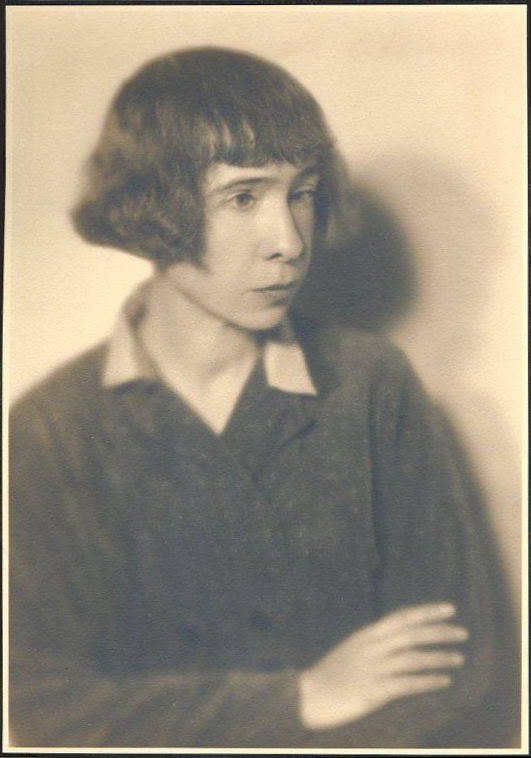 Slovene writer Alma Karlin (1889–1950), a portrait taken in Villach and kept by Celje Central Library
Slovene writer Alma Karlin (1889–1950), a portrait taken in Villach and kept by Celje Central Library
"asset": { "media":"", "credit":"File:Spominska soba Alme Karlin (logo).svg", "caption":"Caption text goes here" } } ] "date": [ { "startDate":"2,014", "endDate":"2,014", "headline":"Universal Studio of Street Arts",
"text":"Universal Studio of Street Arts is an artist-run studio and gallery founded in 2014. It holds exhibitions, events and provides any kind of artistic services.
","asset": { "media":"", "credit":"", "caption":"Caption text goes here" } } ]... further results} } }}


